When The Millennial Couple Next Door DESTROYED My Garden, I Taught Them A Serious Lesson
The Quiet Life
My name is Carol Fletcher, I’m 72, and until recently, I thought my quiet little life in the Tennessee hills couldn’t be shaken. I’ve lived in the same modest ranch house for nearly fifty years, with every creaky floorboard and sun-faded curtain telling a story of its own. Walter, my husband, passed ten years ago—heart attack while changing the oil in his truck. The kind of ordinary death that somehow makes it harder to accept. But I stayed put, finding comfort in my routines. Every morning, I wake up at 6:30, make a pot of coffee strong enough to put hair on your chest (as Walter used to say), and head out to tend my rose bushes while my stubborn old tabby cat Jasper weaves between my ankles, complaining about everything under the sun. My niece Molly comes over every Sunday for dinner. She’s as close to a daughter as I’ll ever have, and watching her pull into my driveway in that beat-up Honda of hers is the highlight of my week. We eat pot roast or fried chicken, and she updates me on all the gossip I pretend not to care about but secretly love. It’s not an exciting life by most standards, but it’s mine, and I’ve been content with it. Or at least I was, until three months ago, when everything I thought was set in stone suddenly wasn’t anymore.
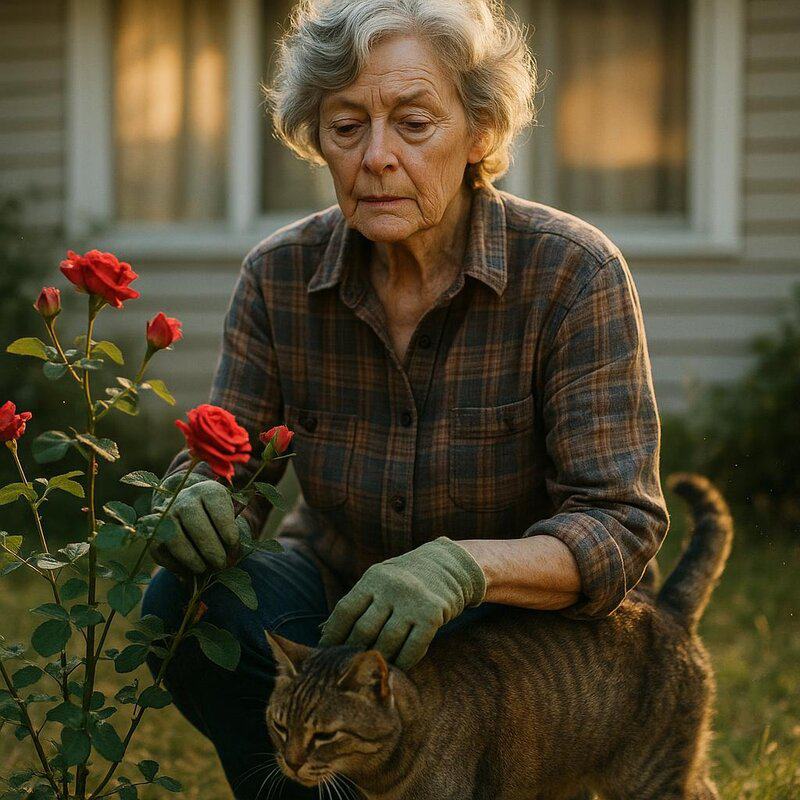
New Neighbors
Three months ago, a young couple—Brandon and Kenzie Harrell—bought the vacant lot next door. I was thrilled at first. That lot had been sitting empty for years, collecting nothing but weeds and the occasional family of raccoons that Jasper would watch through the window like it was his personal nature documentary. The day their contractors arrived with their fancy equipment and blueprints, I did what any Southern woman worth her salt would do—I baked a banana bread and walked it over. Kenzie answered my knock with a bright smile that matched her blonde ponytail. She introduced herself as a real estate agent, all peppy and polished like those women on those home renovation shows Molly tries to get me to watch. Brandon appeared behind her, all muscle and stubble, shaking my hand with the kind of firm grip that told me he’d never heard the word ‘no’ in his life. ‘We’re so excited to be your neighbors,’ Kenzie chirped, accepting my banana bread with perfectly manicured hands. I welcomed them warmly, like any decent neighbor would. It had been lonely with just Jasper for company most days, and I thought having some life next door might be nice. Maybe they’d have children someday who could enjoy my garden, or perhaps they’d join me for coffee on occasion. I walked home feeling lighter than I had in months, imagining pleasant conversations over the fence and maybe even inviting them to Sunday dinner with Molly. Little did I know that the hammering I heard the next morning at 7 AM sharp was just the beginning of my peaceful life being turned upside down.

The Modern Monstrosity
The construction began almost immediately after they moved in. I’d wake up at dawn to the sound of hammering that started precisely at 7 a.m., like they were determined to make sure no one in a half-mile radius could enjoy their morning coffee in peace. Dump trucks backed up for hours with that incessant beeping that made Jasper hide under my bed. The walls went up faster than dandelions after a spring rain, and before I knew it, what stood next door wasn’t a house—it was some kind of modern monstrosity. All black steel and glass walls, with solar panels covering every inch of the roof and a plunge pool that looked about as natural in our Tennessee hills as a penguin in the Sahara. The whole thing looked like it had dropped straight from Mars, or maybe one of those fancy architectural magazines that nobody actually lives in. Still, I kept my manners. Walter always said you catch more flies with honey than vinegar, so I waved whenever I saw them and pretended not to notice when their construction crew trampled the edge of my lawn. Neighbors were neighbors, after all, even if their taste in architecture left something to be desired. I figured the house would be ugly, but we could still be friendly. That’s what I thought, anyway, until the day I came home from the grocery store and discovered they’d done something that crossed a line I didn’t even know needed defending.

The Fence
Two weeks after Brandon and Kenzie moved in, I came home from the grocery store with my arms full of bags and nearly dropped everything right there on the driveway. A tall, raw wooden fence—the kind that looks like it’s trying to keep out a herd of buffalo—was stretching across my backyard. Not at the property line, mind you, but cutting straight through my garden like Moses parting the Red Sea. Right through the middle of my pink azaleas that I’ve nurtured for decades. Right through the stone path that Walter and I had laid by hand in 1981, on our 25th anniversary, when his knees still worked and my back didn’t complain every morning. I stood there frozen, watching as Jasper investigated the monstrosity, his tail twitching with the same indignation I felt rising in my chest. The fence had literally cut my garden in two, with half of my beloved plants now apparently on ‘their side.’ I set my groceries down on the porch and walked the length of that offensive barrier, my hand trailing along the rough wood. With each step, my confusion turned to something hotter and more dangerous. The ice cream in my grocery bags was probably melting, but that was the least of my concerns. This wasn’t just about a fence. This was about boundaries—and not just the kind you mark with wood and nails. I straightened my back, feeling every one of my 72 years and not a bit apologetic for them. If these young folks thought they could just steamroll over Carol Fletcher because she was old and alone, they were about to learn a very important lesson.
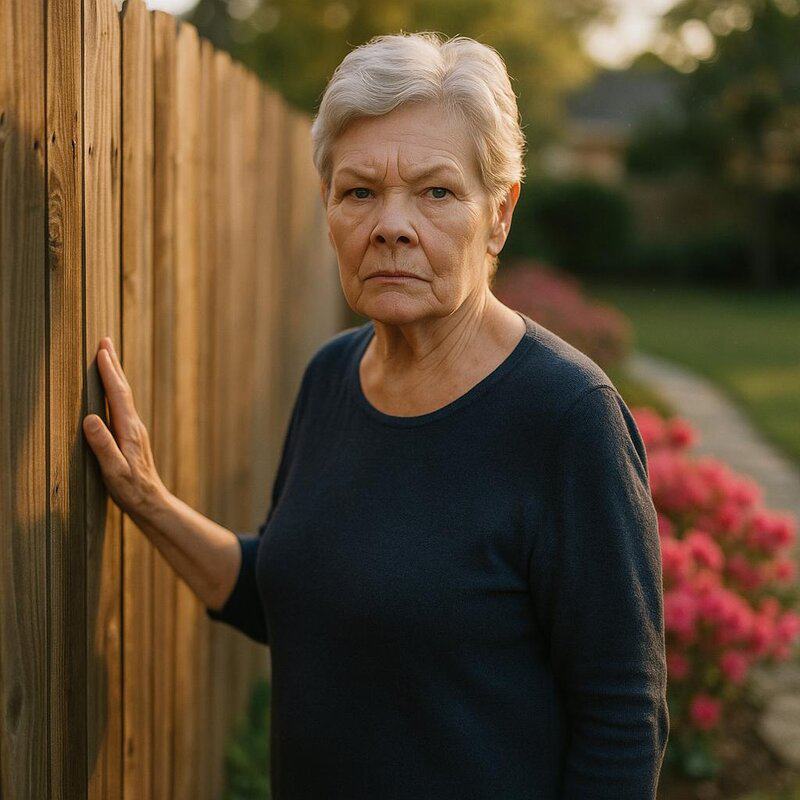
Sweet Tea Diplomacy
I marched over to the Harrells’ that evening with a pitcher of sweet tea and my grandmother’s crystal glasses—the ones I only bring out for special occasions. I figured we could talk this through like civilized folks. Their doorbell played some fancy tune I didn’t recognize, and Kenzie answered wearing yoga pants that probably cost more than my monthly social security check. ‘Oh, Carol! How… thoughtful,’ she said, eyeing the pitcher like it might contain poison. When I explained about the fence cutting through my garden, she blinked at me like I was speaking in tongues. ‘Our survey says that land is ours,’ she said, her voice cool as January frost. ‘We had the county check it. You might want to update your paperwork.’ I laughed, thinking surely this was some kind of misunderstanding. I’ve been tending those azaleas since before she was born! Brandon appeared behind her, all six feet of him leaning against the doorframe with that smug look men get when they think they’ve got the upper hand. ‘You can always take it up with zoning if you’re so sure,’ he said, smirking as he gestured toward his shiny Tesla in the driveway, like owning an expensive car somehow made him right. I stood there, pitcher still full, glasses unused, feeling something I hadn’t felt in years—a slow-burning anger that started in my stomach and worked its way up to my throat. As I walked back home, I realized one thing was certain: these young folks had no idea who they were dealing with. Carol Fletcher might be 72, but she wasn’t about to be pushed around.
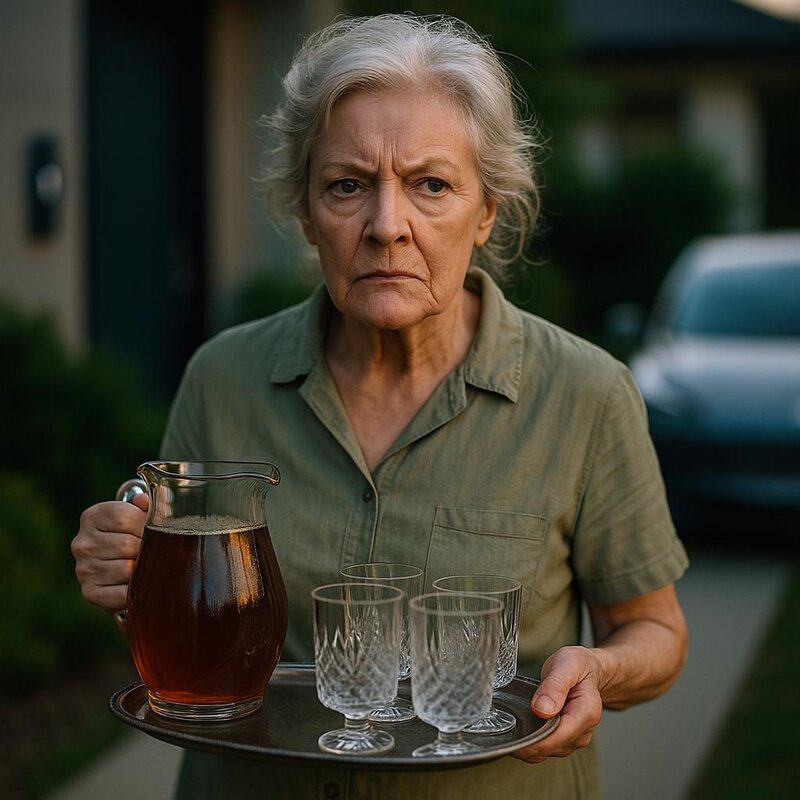
The Deed
The next morning, I woke up with determination burning in my chest. I marched straight to my home office, pulled out the old oak filing cabinet Walter had built, and started digging through decades of paperwork. There it was—our deed and original plat map, yellowed with age but carefully preserved in Walter’s old accordion folder labeled ‘PROPERTY’ in his neat block handwriting. I spread everything across my kitchen table, right next to my cooling coffee. The papers crinkled under my fingers as I traced the property lines just as Walter had shown me countless times. ‘Always know what’s yours, Carol,’ he used to say. According to these documents, our garden was well within our property line—had been for nearly fifty years. The azaleas, the stone path, all of it was ours, fair and square. I put on my reading glasses and double-checked every measurement, every boundary marker. Nothing had changed since we bought this place in 1973. So how on earth were the Harrells claiming otherwise? Something wasn’t adding up, and I had a sinking feeling in my stomach. This wasn’t just a neighborly misunderstanding—this was something else entirely. I carefully folded the documents and slipped them into my purse. If Brandon and Kenzie wanted to play hardball with property lines, they were about to learn that this 72-year-old widow wasn’t going down without a fight. What I discovered next would make my blood run cold.

The Zoning Office
The next morning, I put on my navy cardigan—the one Walter always said brought out my eyes—and drove my old Buick downtown to the county zoning office. I’d been there exactly twice in my life: once when we bought the house, and once when Walter wanted to build the shed. The place hadn’t changed much—same fluorescent lights buzzing overhead, same faded posters about building codes on the walls. The young man at the counter couldn’t have been more than twenty-five, with a wispy attempt at a beard and eyes glued to his computer screen. He barely looked up when I placed my yellowed documents on the counter. ‘I need to verify my property line,’ I explained, trying to keep my voice steady. ‘There seems to be some confusion with my new neighbors.’ He sighed like I’d asked him to climb Mount Everest, then started typing with the bored efficiency of someone who’d rather be anywhere else. After what felt like an eternity of clicking and scrolling, he turned his monitor toward me. ‘According to our records,’ he said flatly, ‘your property line was adjusted three months ago.’ I stared at the screen, my heart dropping to my sensible shoes. There it was in black and white—a five-foot shift in the boundary line, dated exactly when the Harrells must have been closing on their property. ‘That’s impossible,’ I whispered. ‘We’ve owned that land since 1973.’ He shrugged, already turning back to whatever was on his phone under the desk. ‘Records get updated, ma’am.’ I left the office with my hands shaking so badly I could barely get my key in the ignition, clutching papers that no longer protected the home Walter and I had built together. Something was very wrong here, and I had a sinking feeling the fence was just the beginning.
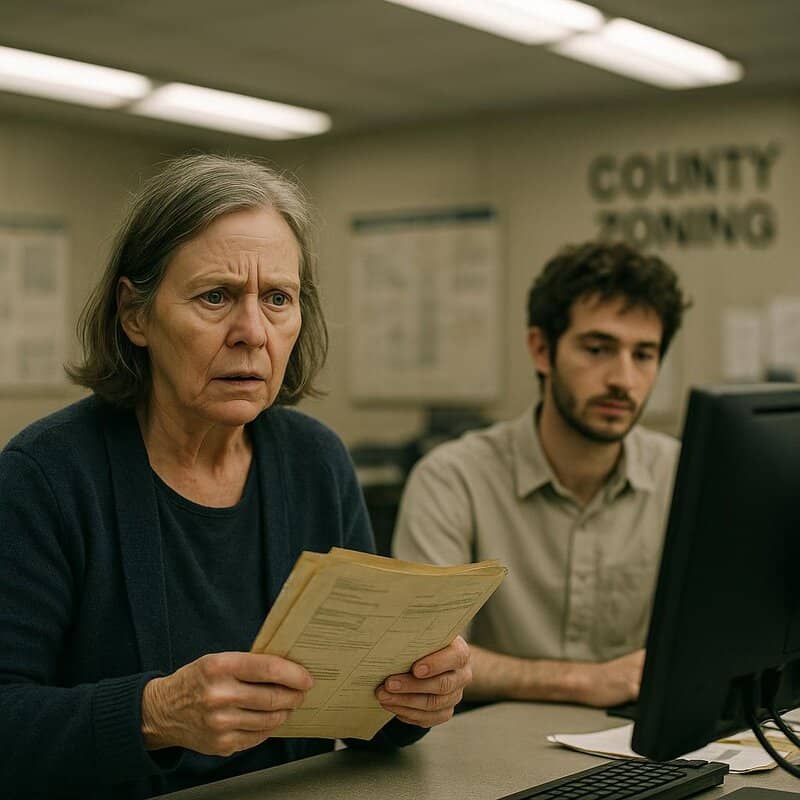
Sunday Dinner Disrupted
That Sunday, I was a mess. I’d barely slept, my mind racing with property lines and zoning offices and that awful fence cutting through my garden like a scar. When Molly’s Honda pulled into the driveway, I was sitting on the porch steps instead of in the kitchen where I should’ve been finishing up our dinner. ‘Aunt Carol?’ she called, concern etching her face as she climbed out of her car. ‘Are you okay?’ I just pointed wordlessly at the wooden monstrosity dividing my garden. Molly’s eyes widened as she took in the fence slicing right through my pink azaleas and Walter’s stone path. We sat on the porch with our plates of barely-touched fried chicken, and I told her everything—the fence, the cold response from the Harrells, and the zoning office claiming my property line had somehow ‘updated’ after nearly fifty years. ‘That can’t be legal, Aunt Carol,’ she said firmly, setting down her fork with such force that Jasper, who’d been hoping for a chicken scrap, darted under my chair. ‘Something’s not right here.’ She pulled out her phone and started typing furiously. ‘My friend from college works for the historical society. They keep records of all the original surveys.’ For the first time since that fence appeared, I felt a flicker of hope warming my chest. Molly reached across the table and squeezed my hand, her eyes fierce with determination. ‘Nobody messes with my aunt’s garden,’ she declared. ‘We’re going to fight this, and those fancy newcomers have no idea what they’re up against.’ Little did I know that Molly’s librarian skills were about to uncover something that would turn this whole situation on its head.
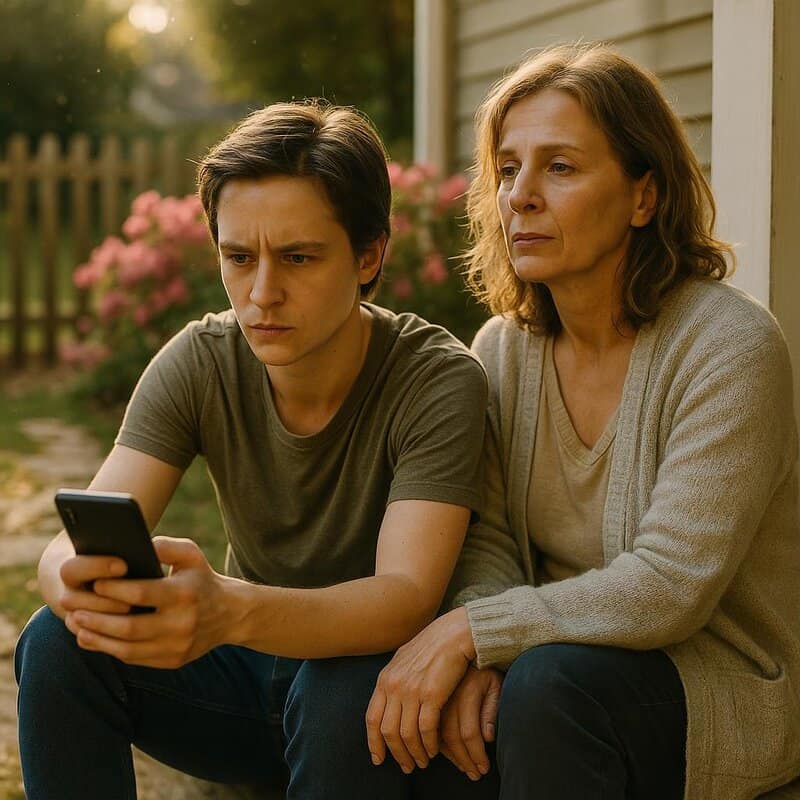
Calling Hank
I didn’t know what else to do, so I called Hank, my late husband’s best friend. He’s been retired from his law practice for nearly a decade now, but still wears those same bolo ties and smells like pipe tobacco. Some things never change, and thank goodness for that. When I explained the situation over the phone, he didn’t hesitate. ‘I’ll be there tomorrow morning, Carol. Don’t you worry.’ True to his word, Hank’s old Cadillac pulled into my driveway at 9 AM sharp the next day. He walked the property line first, inspecting that awful fence with the careful scrutiny of someone who’d spent forty years picking apart legal documents. His eyes narrowed behind his wire-rimmed glasses as he ran his hand along the raw wood cutting through my azaleas. Back at my kitchen table, with coffee mugs steaming between us, he spread out all my documents—the deed, the plat map, the zoning office printout. He adjusted his bolo tie and leaned back in his chair after reading everything twice. ‘This doesn’t smell right, Carol,’ he said, tapping his finger on the paperwork. ‘Somebody’s messing around, and we’re going to figure out who.’ The way he said it—with that same determined tone he used when helping Walter fight the county over our property taxes in ’92—made me feel like maybe, just maybe, I wasn’t fighting this battle alone. What Hank discovered next would turn this neighborhood dispute into something far more serious than I could have imagined.
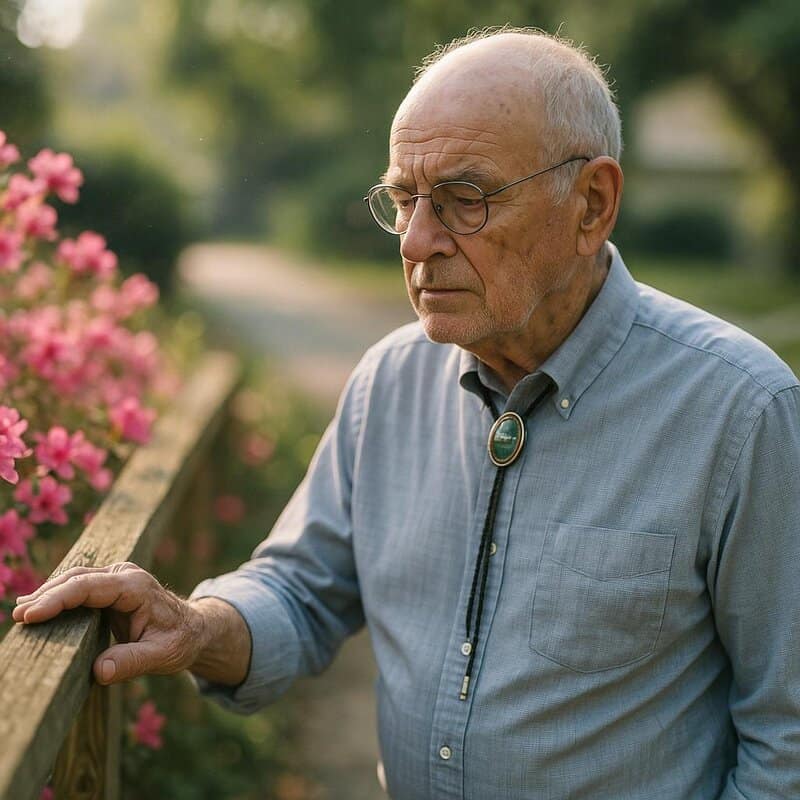
The Investigation Begins
Hank was in full lawyer mode the next morning, even though he’d been retired for years. He commandeered my kitchen table, spreading out documents while making calls on my landline—yes, I still have one of those dinosaurs. ‘Carol,’ he said between sips of my coffee, ‘property records don’t just magically update themselves. Someone’s got their fingerprints all over this.’ He reached out to his old drinking buddy at the zoning office, a man named Frank who apparently owed Hank ‘more favors than he could count.’ They arranged to meet us at Dotty’s Diner downtown—off the record, of course. As we drove there in Hank’s Cadillac that smelled of pipe tobacco and old leather, I felt like I was in one of those crime shows Molly watches. ‘You know,’ Hank said, adjusting his bolo tie at a stoplight, ‘in forty years of practice, I’ve seen all kinds of property disputes, but this one stinks to high heaven.’ He patted my hand. ‘Brandon’s too confident, too smug. Like someone’s got his back.’ When we pulled into the diner’s parking lot, I spotted Frank already inside, nervously fidgeting with a coffee mug. ‘Now Carol,’ Hank whispered as we walked in, ‘let me do the talking. Frank’s skittish as a cat, but what he’s about to tell us might just blow this whole thing wide open.’

Diner Revelations
Dotty’s Diner was one of those places frozen in time—red vinyl booths worn smooth from decades of sliding hips, and the constant scent of coffee and pie that seemed baked into the walls. Jim Holbrook was already nursing a mug when we slid into the booth across from him. He’d worked in zoning for thirty years and looked every bit of it, with deep creases around his eyes and a permanent coffee stain on his tie. ‘I shouldn’t be telling you this,’ he muttered, glancing nervously at the door. ‘But something ain’t right with your situation, Carol.’ He leaned in so close I could smell the cherry pie on his breath. ‘Brandon’s cousin, that new kid Tyler, he’s only been in the department six months but somehow got assigned to their survey approval.’ Jim’s fingers drummed anxiously on his mug. ‘The kid’s already got access to the digital archives—took most of us years to get that clearance.’ Hank and I exchanged glances as Jim continued, his voice barely above a whisper. ‘Records don’t just update themselves, and property lines don’t shift after fifty years without someone’s hand in it.’ As we left the diner, the bell above the door jingling our exit, I realized with a sinking feeling that this wasn’t just about a fence anymore. Someone had deliberately tampered with public records, and I was beginning to understand exactly how far the Harrells were willing to go to get what they wanted.

Molly Steps In
When I told Molly what we’d learned from Jim at the diner, her eyes lit up with that fierce determination I’ve seen since she was a little girl. ‘I’m a librarian, Aunt Carol. Research is what I do,’ she declared, already opening her laptop at my kitchen table. Jasper immediately curled up beside her, as if appointed her official assistant. For the next three days, Molly was like a woman possessed. She started calling the local historical society, the county records office, and even tracked down a retired surveyor who’d worked in our area since the 1970s. ‘We need evidence that predates their tampering,’ she explained, her fingers flying across the keyboard while I kept her supplied with sweet tea and pimento cheese sandwiches. I watched in amazement as my niece transformed from the quiet bookworm I knew into a relentless investigator. ‘These people think they can take advantage of you because you’re older and alone,’ she said, her voice tight with anger. ‘They picked the wrong family to mess with.’ When she wasn’t on the phone or computer, she was digging through my attic for any photos Walter might have taken of our property over the years. ‘Documentation is everything,’ she kept saying. I hadn’t seen this side of Molly before—so much like her mother, my sister Jane, who never backed down from a fight. What Molly discovered next would be the smoking gun we needed, and those fancy newcomers would never see it coming.

The Neighbor Network
While Molly was deep in her research rabbit hole, I decided to do some investigating of my own. I put on my favorite cardigan—the one with pockets deep enough for tissues and peppermints—and took a stroll around the neighborhood. First stop: Edith Miller’s house across the street. She’s been here even longer than I have, and that woman knows everything that happens within a five-block radius. ‘Carol! Come in, come in,’ she called, already putting the kettle on when I knocked. Over Earl Grey and lemon cookies, Edith’s face darkened when I mentioned the Harrells. ‘Those two,’ she huffed, setting her teacup down with a clatter. ‘They came by last month with some nonsense offer for my house. Cash deal, they said, but insulting low. Told me my Victorian was—and I quote—’dragging down neighborhood appeal.’ Can you imagine?’ By the time I’d finished my tea circuit—Edith, then Margaret three doors down, then the Hendersons on the corner—a disturbing pattern emerged. The Harrells had approached at least three other elderly homeowners with similar lowball offers, always with that same condescending tone. ‘You should consider downsizing at your age,’ they’d told Margaret, who’s only 68 and gardens circles around people half her age. Walking home, I felt a chill that had nothing to do with the autumn breeze. This wasn’t just about my garden or a fence—the Harrells were up to something bigger in our quiet neighborhood, and I had a feeling their modern monstrosity was just the beginning of their plans.

The Historical Society
A week later, I was dozing in my recliner with Jasper purring on my lap when the phone rang. It was Molly, and she was practically shouting with excitement. ‘Aunt Carol! We got it! The historical society found something!’ I sat up so fast that poor Jasper gave me a look of utter betrayal before stalking off. ‘What did they find?’ I asked, my heart suddenly racing. ‘An aerial photograph from 1982!’ Molly explained. ‘It shows your entire property, including the garden beds and that stone path you and Uncle Walter laid. They’re exactly where you said they’ve always been!’ I clutched the phone tighter as she continued. ‘It’s black and white and a bit grainy, but it’s clear as day—that property line hasn’t moved an inch in 40 years.’ I felt tears welling up in my eyes. For the first time since that awful fence appeared, I felt something beyond anger and helplessness—I felt hope. ‘Can you bring it over?’ I asked, my voice wavering. ‘Already on my way,’ Molly replied. ‘And Aunt Carol? We’ve got them. This is the proof we need.’ As I hung up the phone, I walked to my window and stared at that hideous fence cutting through my azaleas. Brandon and Kenzie thought they could steamroll over an old widow with fancy paperwork and connections. They were about to learn that sometimes, history itself rises up to defend those who’ve been wronged.

Legal Strategy
The next morning, Hank arrived at my doorstep looking like he meant business. His bolo tie was perfectly centered, and he carried a worn leather briefcase I hadn’t seen since Walter’s property tax dispute years ago. ‘Let’s get to work, Carol,’ he said, spreading documents across my dining table like a general planning a battle. The aerial photograph from the historical society took center position, surrounded by my yellowed deed and original plat map. Hank’s legal pad was filled with neat handwriting, arrows connecting different points. ‘We’ve got enough to file a civil complaint,’ he explained, circling key points with his pen. ‘Property fraud, tampering with public records, possible conspiracy.’ The words sounded so official, so serious—like something from those courtroom dramas Molly watches. ‘Do you really think we can win against people like them?’ I asked, watching Jasper bat at Hank’s dangling pen cap. Hank looked up at me over his reading glasses. ‘Carol Fletcher, I’ve known you for forty years. You’ve never backed down from what’s right, and we’re not starting now.’ He tapped the aerial photo. ‘This is our smoking gun.’ As I gazed out the window at my bisected garden—azaleas struggling against that awful fence—I felt a strange mix of dread and determination. I wasn’t just fighting for flowers and a stone path; I was fighting for Walter’s memory, for the home we’d built together. What I didn’t realize then was just how dirty the Harrells were willing to play once they received our legal notice.
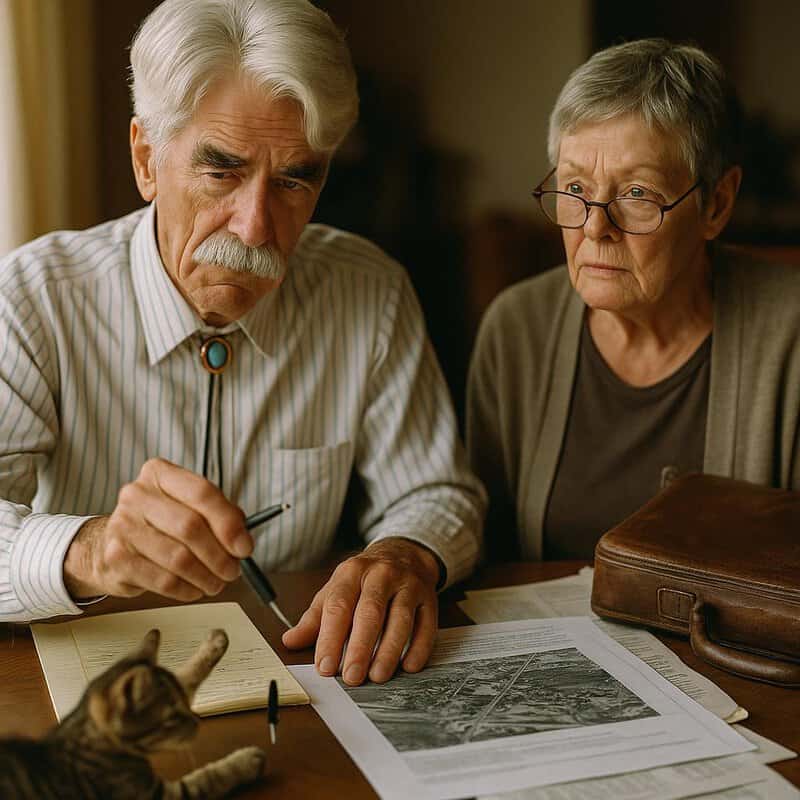
Filing Day
The day we filed our complaint was one I won’t soon forget. I put on my best dress—the navy blue one with pearl buttons that I’d worn to Walter’s funeral—and felt my heart hammering as Hank drove us downtown to the courthouse. That building had always intimidated me, all cold marble and echoing footsteps, like it was designed to make ordinary folks feel small. Hank, bless him, looked right at home with his leather briefcase and perfectly centered bolo tie. ‘Just let me do the talking, Carol,’ he said, patting my trembling hand as we walked up those imposing steps. Inside, the clerk’s expression changed when she saw the names on our paperwork. ‘Third case against them this month,’ she muttered, not quite under her breath, as she stamped our forms with practiced efficiency. My eyebrows shot up, and I exchanged a meaningful glance with Hank. So we weren’t the only ones the Harrells were bullying! On the drive home, I stared out the window at the Tennessee hills rolling by, wondering about those other cases. Who else had they tried to steamroll? Elderly widows like me? Young families who couldn’t afford legal help? ‘Hank,’ I said finally, breaking the thoughtful silence, ‘I think we might have stumbled onto something bigger than just my garden.’ What I didn’t realize then was just how right I was—and how dangerous things were about to become.
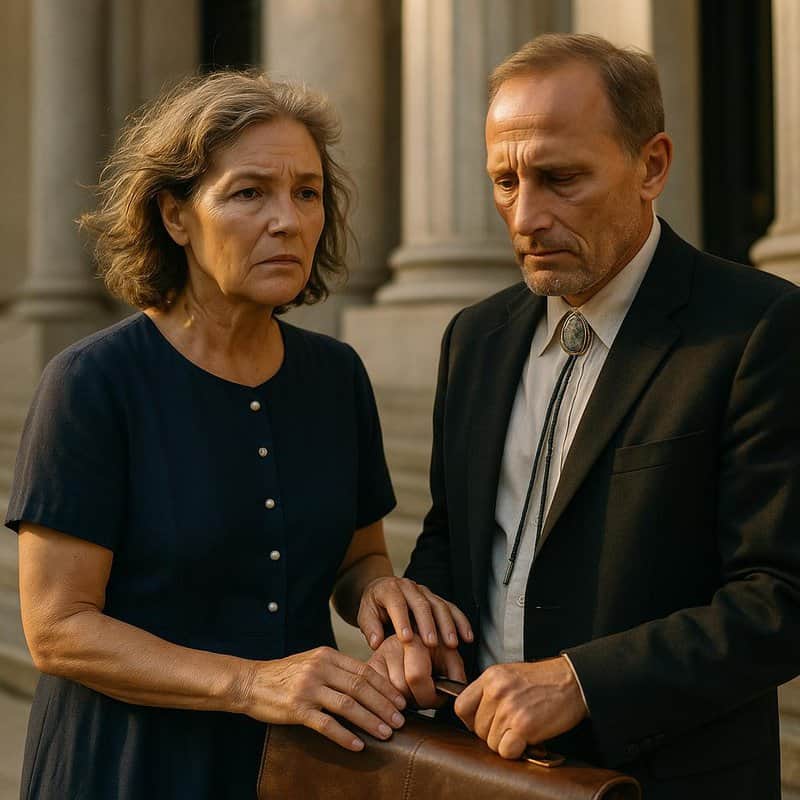
The Harrells’ Response
Three days after filing our complaint, I was washing dishes at my kitchen sink when a sleek black Mercedes pulled into the Harrells’ driveway. A man in a charcoal suit that probably cost more than my monthly social security check stepped out, clutching a leather briefcase that screamed ‘expensive lawyer.’ I dried my hands on my apron and watched through the window as Brandon greeted him with that smug handshake of his. They disappeared inside their glass monstrosity for over an hour. I couldn’t help myself—I kept peeking out while pretending to water my surviving plants. When the lawyer finally left, Kenzie stood in their doorway with her arms crossed, looking directly at my house with an expression cold enough to freeze lemonade. The next morning, a knock at my door revealed a courier with a certified letter requiring my signature. My hands trembled as I opened the envelope at my kitchen table. They were countersuing me—ME!—for harassment and defamation, demanding $50,000 in damages! The room seemed to spin around me. That was more money than I’d seen in my entire life. I fumbled for the phone and called Hank, my voice cracking as I told him the news. ‘They’re trying to scare you, Carol,’ he said firmly. ‘Classic intimidation tactic.’ Maybe so, but it was working. What if I lost my house? What if everything Walter and I had built together was taken away because I dared to stand up to these people? What I didn’t know then was that the Harrells had just made their first serious mistake—one that would come back to haunt them in ways none of us could have imagined.
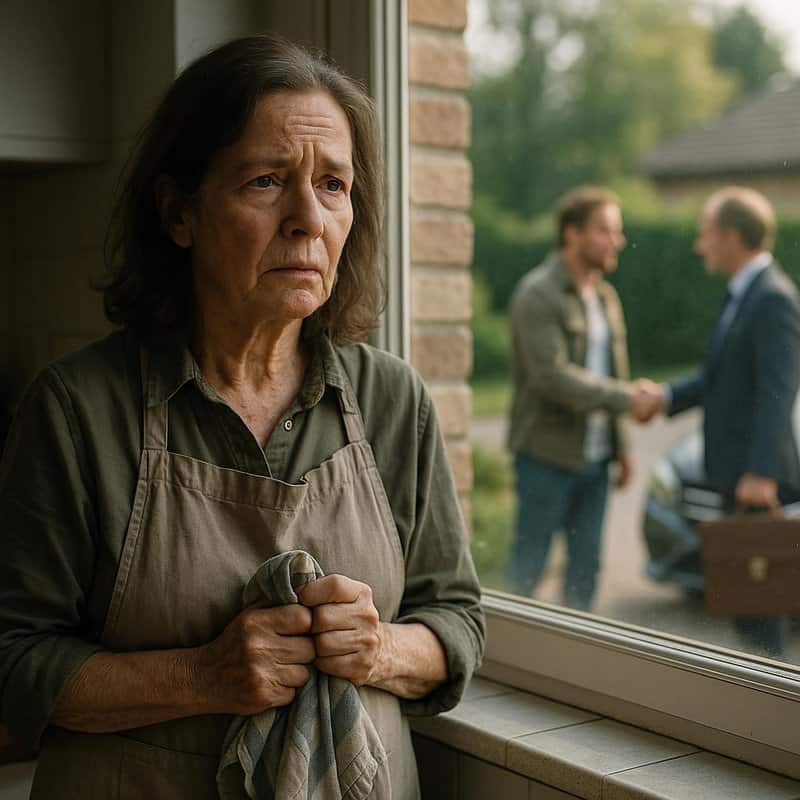
Community Support
I was sitting at my kitchen table, staring at that ridiculous countersuit letter, when my doorbell rang. It was Edith, holding a still-warm apple pie. ‘The whole neighborhood’s talking, Carol,’ she said, bustling past me. ‘And we’re not letting those fancy newcomers push you around.’ Before I could even slice that pie, Margaret arrived with her famous chicken casserole, followed by the Hendersons with a bottle of homemade blackberry wine. By seven o’clock, my modest living room was packed with neighbors I’d known for decades—and some I barely knew beyond a wave across the street. Edith, ever the organizer, stood in the center of my living room and tapped a spoon against her glass. ‘The Harrells think they can pick us off one by one,’ she announced. ‘Well, not in our neighborhood!’ One by one, neighbors stood up and shared stories—lowball offers on their homes, veiled threats about ‘neighborhood improvement,’ mysterious surveyors on their properties. The Johnsons from two streets over had even found stakes mysteriously moved on their land. By the end of the night, we’d created the ‘Fletcher Defense Fund’ (despite my protests about using my name), collected nearly $2,000 in cash, and had six neighbors willing to testify about the Harrells’ tactics. As everyone filed out with promises to return, Molly squeezed my hand. ‘See, Aunt Carol? You’re not alone in this fight.’ What none of us realized was that Brandon Harrell had been watching my house all evening, noting every person who came to support me—and he was already planning his next move.
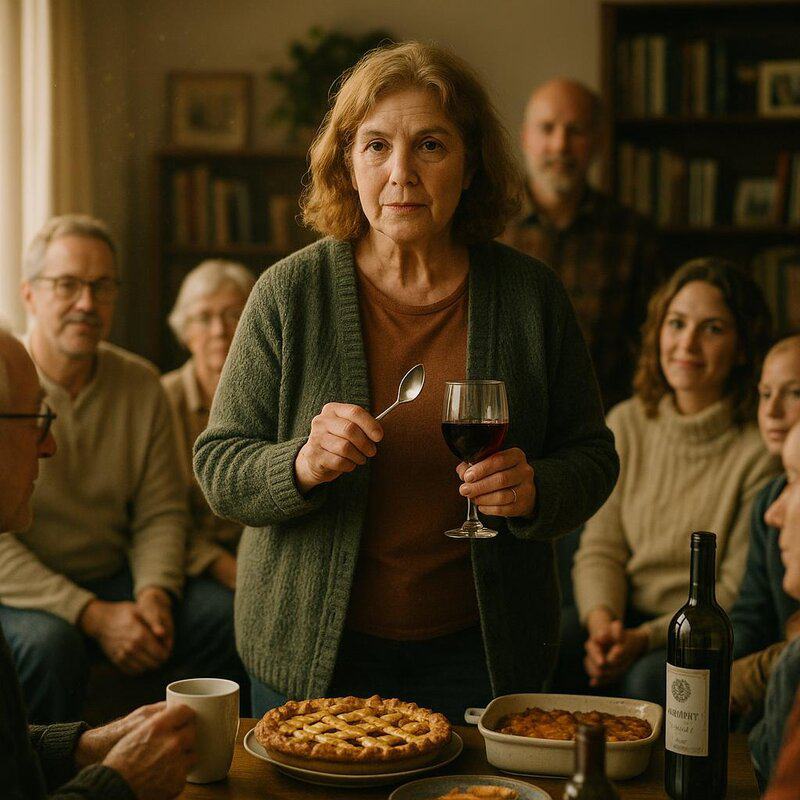
The Cousin Connection
The next morning, Molly burst through my front door with her laptop clutched to her chest, eyes wide with excitement. ‘Aunt Carol, I’ve found something big,’ she announced, setting up at my kitchen table where Jasper immediately claimed a spot beside her keyboard. She turned the screen toward me, showing a local government website with campaign finance records. ‘Look here,’ she said, pointing to a highlighted donation. ‘Brandon Harrell made a $10,000 contribution to Mayor Wilson’s reelection fund exactly three weeks before his cousin Tyler got hired at the zoning department.’ I squinted at the screen, my stomach tightening. ‘And when was that?’ I asked, already suspecting the answer. ‘Four months ago,’ Molly replied grimly. ‘Just before they bought the lot next door.’ The pieces were falling into place like a jigsaw puzzle revealing an ugly picture. ‘It’s all connected,’ she continued, scrolling through more documents. ‘They’ve been planning this for months—buying the lot, getting Tyler positioned in zoning, altering the property records.’ I sank into a chair, my hands trembling slightly. This wasn’t just opportunistic neighbors taking advantage of an old widow—this was calculated, coordinated corruption. ‘Those sneaky, underhanded…’ I couldn’t even finish my sentence. The realization that they’d orchestrated this whole scheme made my blood boil in a way I hadn’t felt since Walter caught the Henderson boy stealing our mailbox in ’92. What they didn’t count on was that this 72-year-old woman wasn’t going down without a fight—and now we had the paper trail to prove exactly how deep their deception went.
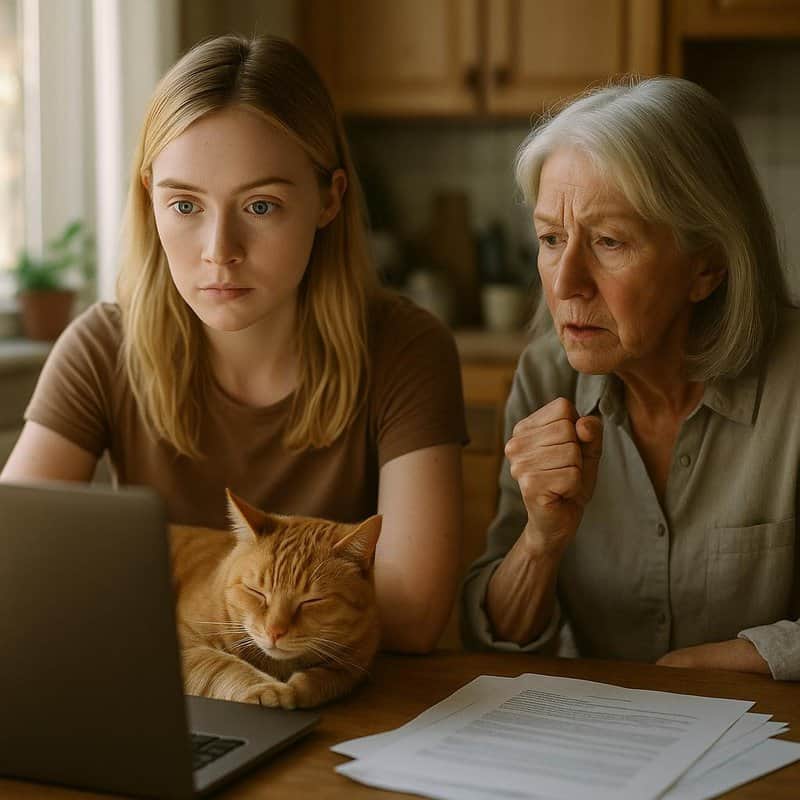
Preparing for Court
The week before our court date, my dining room transformed into a makeshift courtroom. Hank, still sharp as a tack at 78, drilled me like I was prepping for the bar exam. ‘Carol, they’re going to try every trick in the book,’ he warned, pacing back and forth with his reading glasses perched on the end of his nose. ‘They’ll suggest you’re confused about property lines because of your age. They’ll try to trip you up on dates.’ We spent hours rehearsing my testimony until I could recite the history of my property backward and forward. Molly created flashcards with important dates and measurements, quizzing me during our Sunday dinner. ‘What year did you and Uncle Walter install the stone path?’ she’d ask between bites of pot roast. ‘1981, May through July, took us six weekends,’ I’d fire back without hesitation. The night before court, sleep was impossible. Around midnight, I slipped outside in my robe and slippers, flashlight in hand, and sat beside my divided garden. The moon cast long shadows across the fence that now cut through decades of memories. I ran my fingers through the soil Walter and I had amended every spring for nearly fifty years. ‘I won’t let them take this from us,’ I whispered, as if Walter could hear me. ‘Not one inch.’ What I didn’t know then was that Brandon and Kenzie had been preparing too—and they had one more dirty trick up their designer sleeves that none of us saw coming.
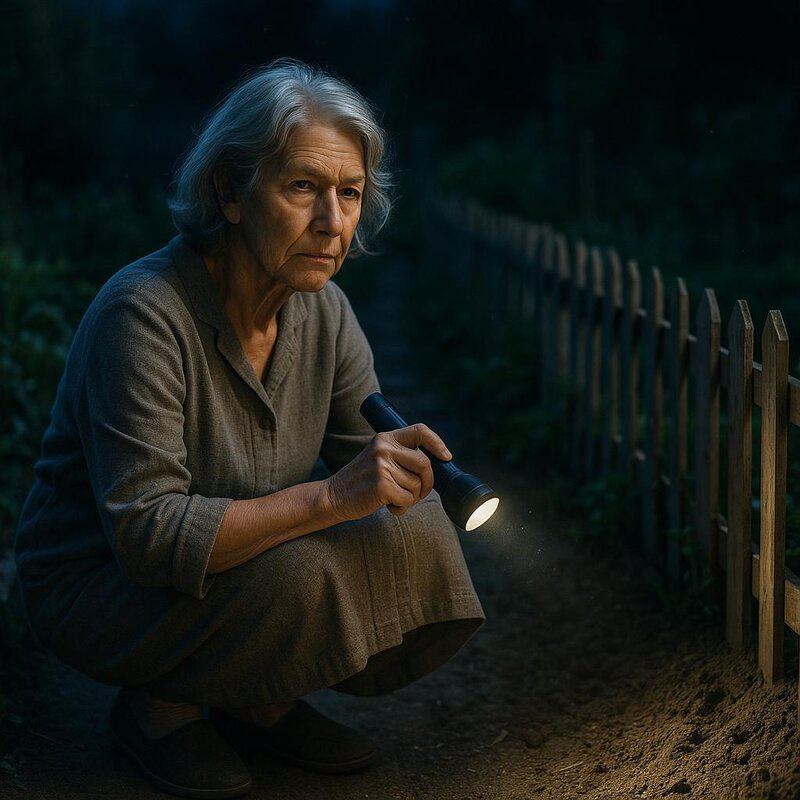
Day in Court
The courtroom felt like an icebox as I smoothed my simple navy dress—the one I’d worn to three funerals and my grandniece’s graduation. Across the aisle, Brandon and Kenzie looked like they’d stepped off a magazine cover. Him in a charcoal suit that probably cost more than my monthly social security check, her tottering on stiletto heels that made me wince just looking at them. Their lawyer—slick as oil with a smile that never reached his eyes—kept whispering in Brandon’s ear. When he presented a glossy, spiral-bound ‘property history’ to the judge, I felt my confidence waver. It looked so official, so convincing with its color-coded maps and fancy letterhead. My own yellowed documents seemed shabby in comparison. ‘Mrs. Fletcher,’ the judge called, ‘please approach the stand.’ My knees creaked as I stood, and I swear I caught Kenzie smirking behind her manicured hand. But something strange happened when I placed my hand on that Bible. All my nervousness melted away. I wasn’t just Carol Fletcher anymore—I was Walter’s widow, keeper of our home, protector of the garden we’d tended together for decades. My voice started soft but grew stronger with each word as I described the stone path my husband and I had laid by hand, the azaleas we’d planted when Nixon was president, the property lines that hadn’t changed in half a century. By the time I finished, even the court reporter had stopped typing to listen. What happened next would change everything—and it started with a single question from the judge that made the blood drain from Brandon Harrell’s face.
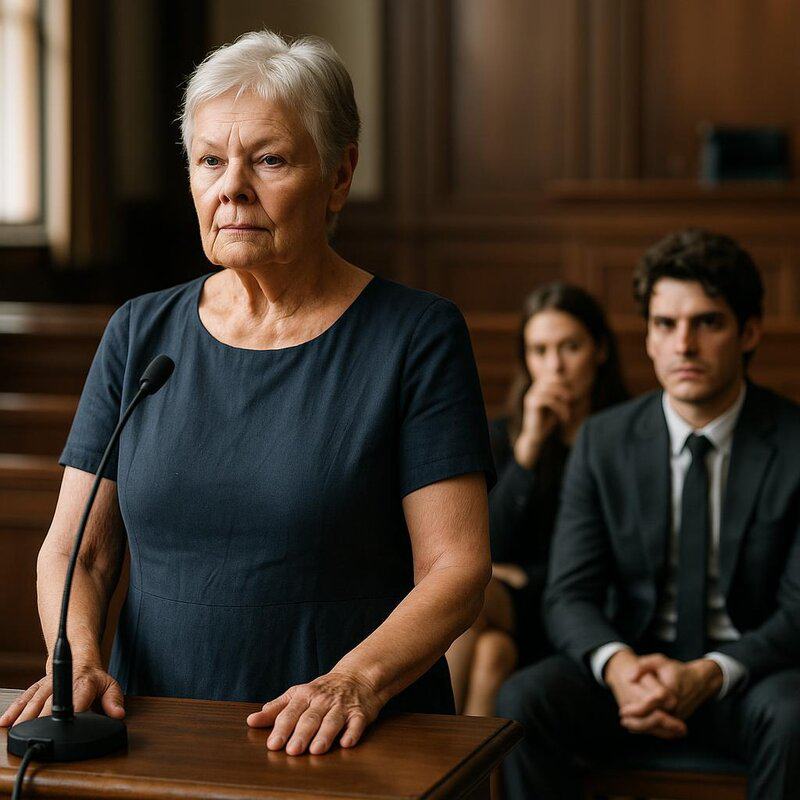
The Age Card
The courtroom fell silent as the Harrells’ lawyer approached me with that practiced look of condescension I’ve seen too many times. He adjusted his tie—probably cost more than my monthly groceries—and spoke in that slow, over-enunciated way people use with toddlers and the elderly. ‘Mrs. Fletcher,’ he said, his voice dripping with fake sympathy, ‘at your age, isn’t it possible you’re simply… misremembering where the property line was?’ I felt Molly stiffen beside me. Hank’s warning echoed in my mind: ‘They’ll use your age against you.’ Well, I’d been ready for this moment. I sat up straighter, my spine finding strength I’d forgotten I had. I fixed that slick lawyer with the same stern look I used to give troublemakers during my thirty years teaching third grade. ‘Young man,’ I replied, my voice clear and steady enough to reach the back of the courtroom, ‘I may be 72 years old, but I’m not confused. That garden has been in the same place since before you were born. I’ve planted every bulb, pruned every branch, and pulled every weed in that soil since 1973. I could walk that property line blindfolded in a thunderstorm.’ A few chuckles rippled through the courtroom. The judge’s mouth twitched—was that a smile? The lawyer’s confident expression faltered for just a moment, and I caught Brandon shifting uncomfortably in his expensive suit. They’d expected a frail, intimidated old lady. What they got instead was a woman who’d spent seven decades learning not to suffer fools—and I was just getting started.
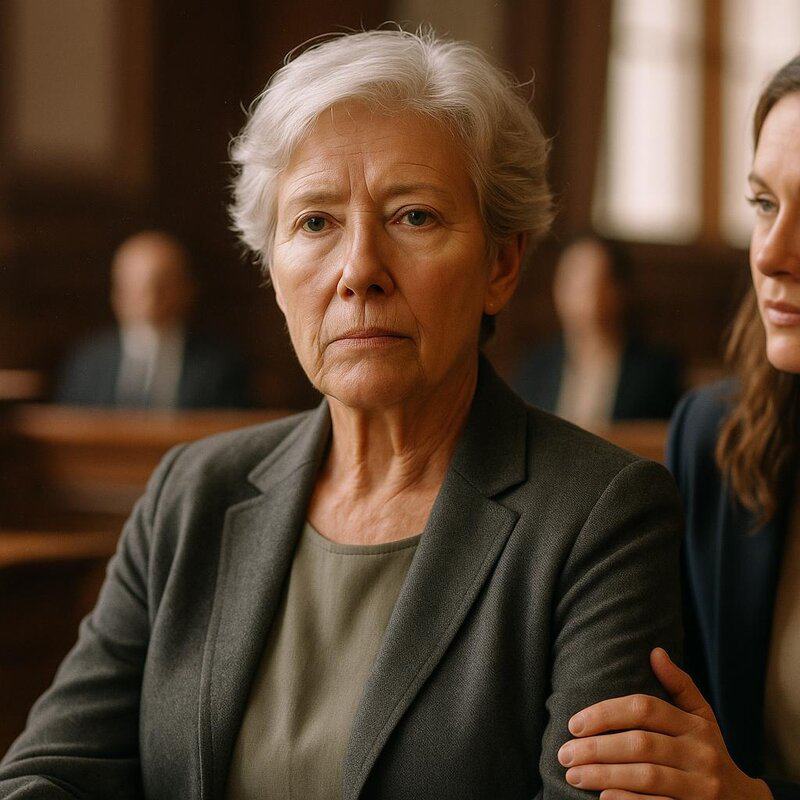
The Aerial Photo
The courtroom fell into a hushed silence as Hank carefully unrolled the aerial photograph from 1982. My heart was pounding so hard I was sure everyone could hear it. ‘Your Honor,’ Hank said, his voice steady and confident, ‘this historical aerial photograph clearly shows Mrs. Fletcher’s garden beds and stone pathway exactly where she has maintained they’ve always been.’ I watched the judge lean forward, adjusting her glasses as she studied the black-and-white image. Though slightly grainy with age, you could clearly see the distinctive curved edges of my garden beds and the stone path Walter and I had laid by hand. Brandon’s face tightened as he whispered urgently to his lawyer, while Kenzie’s perfect posture crumbled for the first time since we’d entered the courtroom. Her shoulders actually slumped – imagine that! Their slick attorney quickly rose to his feet. ‘Your Honor,’ he interjected with forced confidence, ‘this photograph is far too grainy to be conclusive evidence. We can’t possibly determine property lines from such an unclear image.’ The judge raised a single eyebrow – the kind of look I used to give my third-graders when I caught them in an obvious lie. ‘I can see it just fine, Counselor,’ she replied dryly. A ripple of whispers spread through the courtroom, and I felt Molly squeeze my hand under the table. For the first time since this nightmare began, I allowed myself to feel a flicker of hope. What none of us realized was that the Harrells had prepared for this moment – and what happened next would leave everyone in that courtroom absolutely speechless.

Sworn Affidavits
The judge cleared her throat, her voice cutting through the tension. ‘I’ll need sworn affidavits from both parties regarding the property history.’ My heart sank a little—more paperwork, more delays. When the Harrells’ documents arrived three days later, I nearly dropped my reading glasses. Kenzie had submitted a notarized statement claiming my garden had ‘always been on their side of the property line.’ But what caught my eye wasn’t the blatant lie—it was the notary stamp at the bottom: Tina Givens. I gasped so loudly that Jasper leapt off my lap. ‘Hank!’ I whispered urgently, jabbing my finger at the signature. ‘I know her. Tina and I went to high school together!’ Hank adjusted his reading glasses, studying the document. ‘You’re sure it’s the same Tina?’ I nodded vigorously. ‘We were on the reunion committee together just last year.’ Something felt deeply wrong. Tina’s signature looked… off. Too perfect, too steady. Not like the slightly shaky penmanship I remembered from her Christmas cards. ‘I still have her number,’ I said, my mind racing. ‘From the reunion planning.’ Hank’s eyes lit up with that spark I remembered from when he and Walter would solve problems together. ‘Call her. Tonight.’ What I discovered in that phone call would turn this entire case upside down—and prove that sometimes, the smallest connections from our past can save our future.

The Phone Call
That evening, with my hands trembling slightly, I dialed Tina Givens’ number. The phone rang three times before her familiar voice answered. ‘Tina? It’s Carol Fletcher,’ I said, trying to keep my voice steady. ‘From Jefferson High?’ ‘Carol! What a lovely surprise,’ she exclaimed. I took a deep breath and dove right in, explaining about the court case and the notarized document with her signature. There was a long pause on the line. ‘Carol,’ she finally said, her voice suddenly serious, ‘I haven’t notarized anything in over a year. My commission expired and I didn’t renew it.’ My heart nearly jumped out of my chest. ‘And you certainly never notarized anything for someone named Kenzie Harrell?’ I pressed. ‘Absolutely not,’ Tina replied firmly. ‘I don’t even know who that is.’ I gripped the phone tighter, my knuckles turning white. ‘Would you be willing to sign a statement saying that?’ I asked. ‘Of course I would! The nerve of someone forging my signature!’ After thanking her profusely, I hung up and immediately called Hank, nearly dropping the phone in my excitement. ‘Hank!’ I practically shouted when he answered. ‘They forged the notary signature! Tina confirmed she never signed anything for them!’ His low whistle came through the receiver. ‘Carol,’ he said, his voice taking on that tone he used when he was about to deliver good news, ‘we’ve got them. This isn’t just about property lines anymore—we’re talking criminal fraud.’ What I didn’t realize then was just how quickly things would unravel for the Harrells once this bombshell dropped in court.
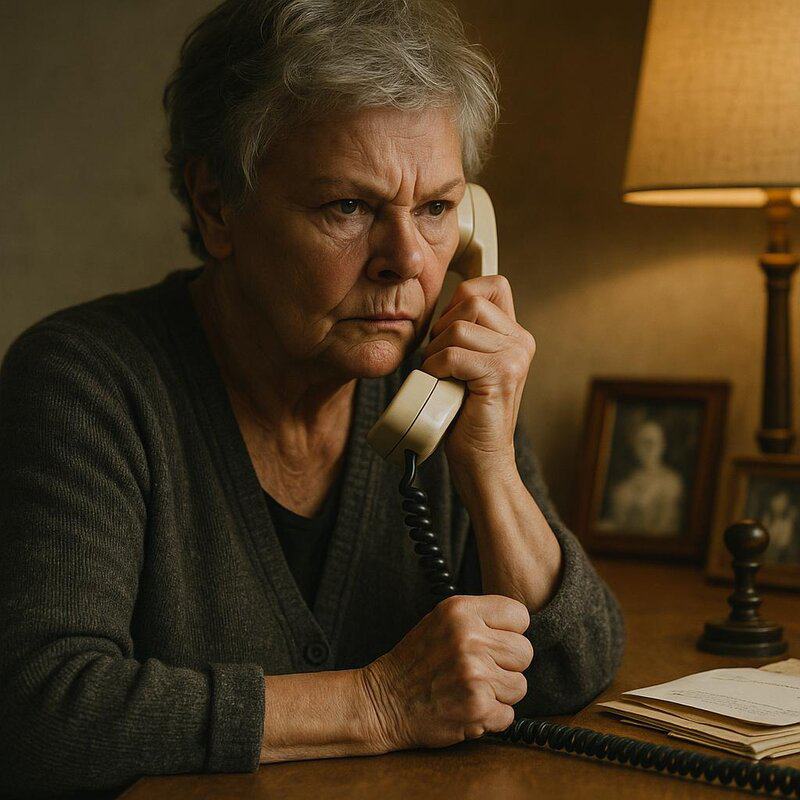
The Forgery Motion
The morning after our discovery, Hank was at my door by 7 a.m., briefcase in hand and determination in his eyes. ‘We’re filing an emergency motion today, Carol. Fraud changes everything.’ I watched him work at my kitchen table, his fingers flying over legal papers with Tina’s notarized statement denying she’d ever signed anything for the Harrells. The judge scheduled a hearing for the very next morning—that’s how serious forgery allegations are taken. That night, I couldn’t sleep a wink. Around midnight, I noticed lights still blazing next door when they’d normally be dark. Pulling back my curtain just a crack, I watched a parade of activity that sent chills down my spine. Cars I didn’t recognize pulled in and out of their driveway. At 2 a.m., I saw Brandon himself loading boxes into his Tesla, moving with urgent purpose. ‘They’re running,’ I whispered to Jasper, who’d joined my midnight surveillance from the windowsill. ‘They know they’re caught.’ I snapped a few pictures with the smartphone Molly had insisted I learn to use (‘Evidence,’ I could hear Hank saying). My hands trembled slightly as I watched what looked suspiciously like people preparing to flee. After everything they’d put me through, after trying to steal my garden and intimidate me with legal threats, were they really going to try to escape justice? Little did they know what was waiting for them at the courthouse tomorrow.
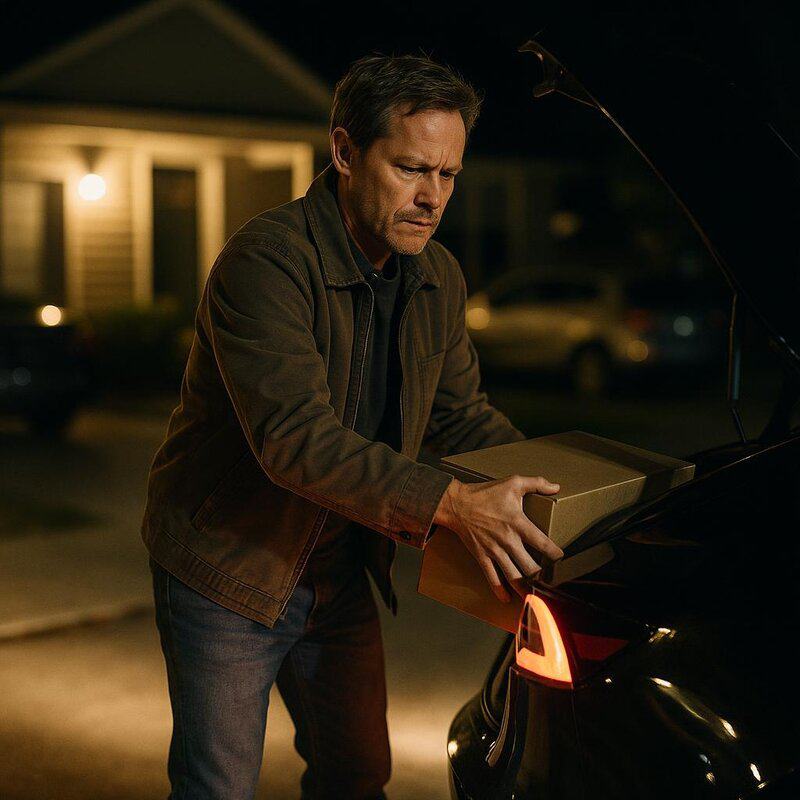
Emergency Hearing
The courtroom was so quiet you could hear a pin drop as Tina Givens took the stand. At 70, she looked every bit as formidable as I remembered from our high school days—the same no-nonsense posture that had made her captain of the debate team. ‘I have not notarized a single document in over a year,’ she stated firmly, looking directly at the judge. ‘And I certainly never signed anything for these people.’ I watched Brandon squirm in his seat, tugging at his collar like it was suddenly two sizes too small. His lawyer attempted some fancy footwork, suggesting a ‘clerical error’ with a nervous laugh that fell flat in the silent courtroom. The judge—bless her heart—wasn’t having any of it. ‘Mr. Harrell,’ she said, her voice cutting through the tension, ‘please approach the stand.’ When Brandon stood, I noticed his designer suit looked like he’d slept in it, wrinkled in all the wrong places. Gone was that arrogant smirk, replaced by something I recognized immediately: fear. As he raised his hand to be sworn in, I caught a slight tremor in his fingers. The confident man who’d tried to bully me out of my garden was crumbling before my eyes. When the judge asked him directly about the forged document, he glanced desperately at his lawyer, then at Kenzie, whose perfect makeup couldn’t hide how pale she’d become. What happened next would make even Jasper’s fur stand on end.
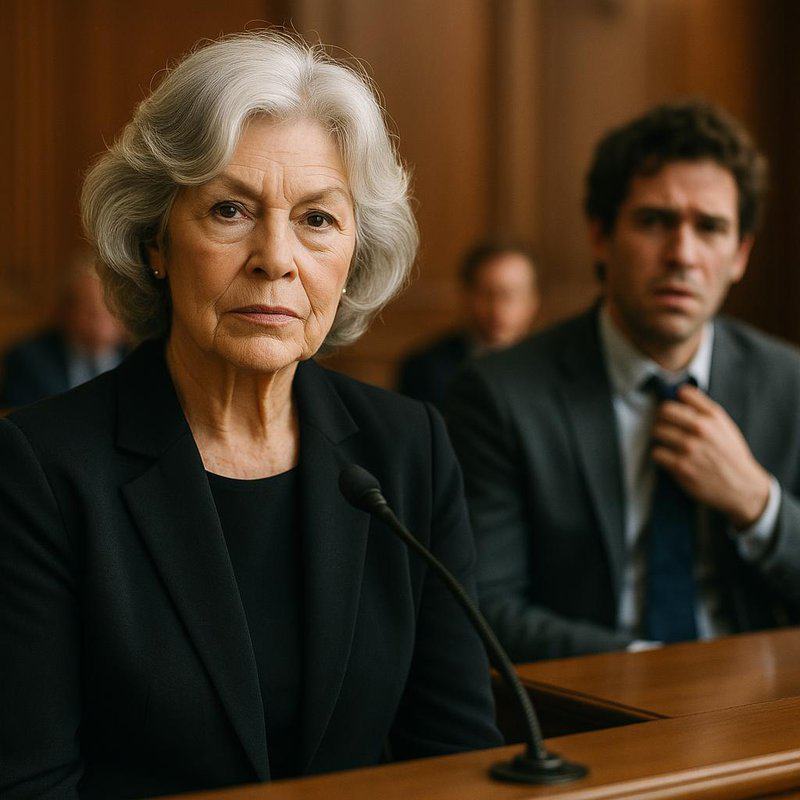
Brandon’s Testimony
I watched Brandon squirm under oath like a worm on hot pavement. The confident businessman who’d tried to steal my garden was suddenly a stammering mess. ‘Mr. Harrell,’ the judge asked pointedly, ‘did you personally arrange for this notarization?’ Brandon’s eyes darted around the courtroom like a cornered animal. He tugged at his collar, sweat beading visibly on his forehead. ‘I… well, you see… there were many documents…’ he mumbled. The judge’s patience visibly thinned with each non-answer. Brandon glanced desperately at his lawyer, who looked equally uncomfortable. Finally, after another direct question about the forged signature, Brandon cracked. ‘Your Honor, my wife handles all the paperwork,’ he blurted out, his voice cracking. ‘I just sign where she tells me to.’ I nearly gasped aloud. This man who’d strutted around like he owned the world had just thrown his own wife under the bus to save himself! I turned to look at Kenzie, whose perfectly made-up face transformed before my eyes. Her expression hardened into something that would’ve turned milk sour. If looks could kill, Brandon would’ve dropped dead right there in the witness box. Molly squeezed my hand under the table, and I had to bite my lip to keep from smiling. The Harrells’ united front was crumbling faster than day-old cornbread. But what happened next would make everyone in that courtroom, including me, absolutely speechless when Kenzie suddenly stood up.
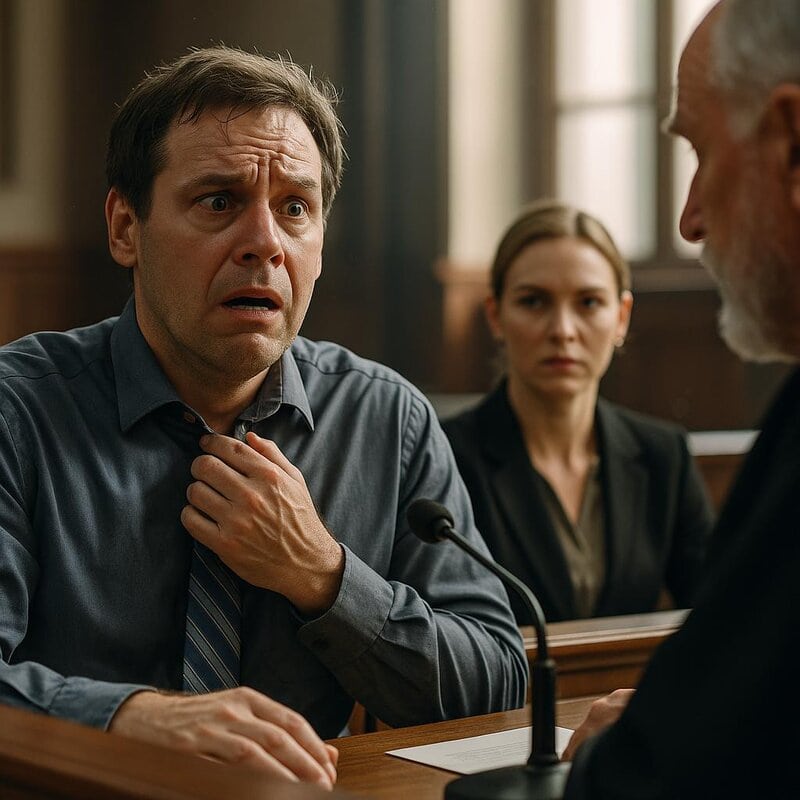
Kenzie’s Turn
When Kenzie took the stand, I swear the temperature in that courtroom dropped ten degrees. Gone was the peppy blonde who’d introduced herself as a real estate agent—in her place stood a woman with ice in her veins and fire in her eyes. She smoothed her designer skirt and glared daggers at Brandon before turning to face the judge with a practiced smile. ‘Your Honor,’ she began, her voice honey-sweet but razor-sharp, ‘my husband has completely misrepresented our arrangement. He handled all property matters while I focused exclusively on interior design. I wouldn’t even know how to contact the zoning office.’ I nearly choked on my breath. The audacity! These two were turning on each other faster than cats in a thunderstorm. Hank, bless him, was ready. He approached with a manila folder and that little smile that always meant he had something good. ‘Mrs. Harrell,’ he said, pulling out printed emails, ‘could you explain these correspondences between your email account and the zoning office? Specifically, these requests about property line adjustments?’ Kenzie’s perfect composure cracked for just a second before she recovered. ‘My account must have been hacked,’ she said with a straight face. I had to grip my armrest to keep from laughing out loud. The judge’s expression said it all—she wasn’t buying any of this nonsense. She ordered a full investigation into the altered documents and possible conspiracy, setting another hearing for the following week. As we left the courtroom, I caught Kenzie and Brandon having what looked like a furious whispered argument by the water fountain. Something told me their marriage wouldn’t survive this case—but what none of us expected was the shocking revelation that would come from Brandon’s cousin when investigators showed up at the zoning office the very next morning.
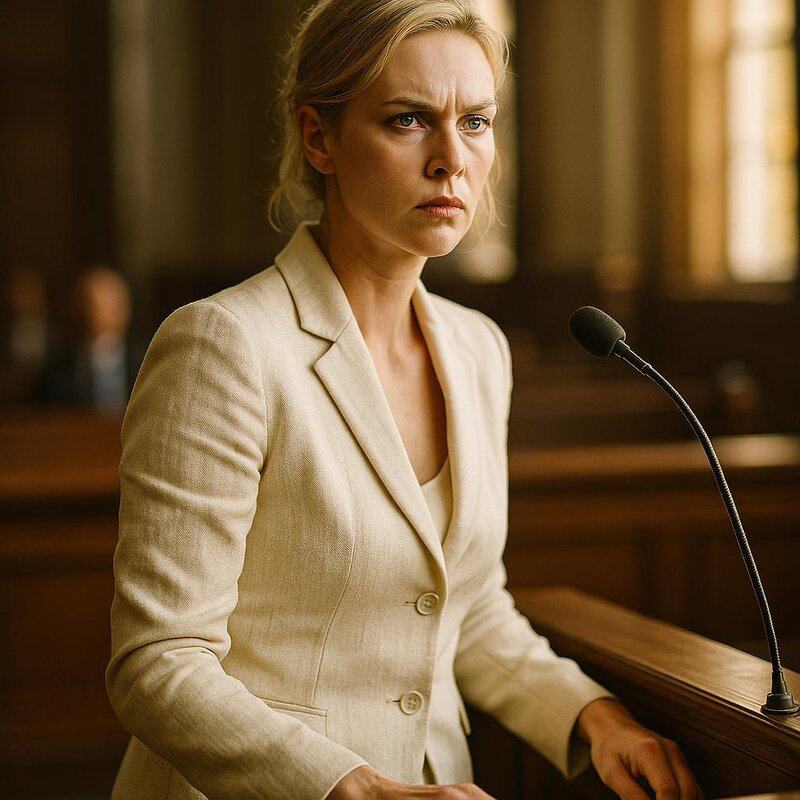
The Investigation Deepens
The morning after the emergency hearing, I was still in my bathrobe when a sharp knock came at the door. Detective Maria Suarez stood on my porch, badge in hand, her no-nonsense demeanor reminding me of my third-grade teacher. ‘Mrs. Fletcher? I’m the special investigator assigned to your case,’ she said, extending her hand. For the next three hours, she meticulously photographed everything—my divided garden, the fence cutting through my azaleas, even the stone path Walter and I had laid together in ’81. I watched her measure distances with a laser tool that would’ve fascinated Walter to no end. ‘This isn’t my first rodeo with cases like yours,’ she confided as we settled on the porch with mugs of chamomile tea. Jasper immediately claimed her lap, traitor that he is. ‘There’s been a pattern lately—new buyers moving into established neighborhoods, mysteriously discovering property line ‘errors’ that always seem to benefit them.’ She flipped through her notes, her expression darkening. ‘Five cases in the last year alone.’ My heart skipped. ‘You think the Harrells have done this before?’ I asked. Detective Suarez’s eyes met mine. ‘I don’t believe in coincidences, Mrs. Fletcher. And neither does Judge Harmon.’ She carefully placed her mug down. ‘What I’m about to tell you isn’t public knowledge yet, but we’ve found connections between these cases that go far beyond your neighbors—and straight into the county records office.’

Tyler’s Office
I was sitting at my kitchen table with a cup of tea when Detective Suarez called with news that made my hand shake so badly I nearly spilled everywhere. ‘Mrs. Fletcher,’ she said, her voice tight with controlled anger, ‘we’ve executed a search warrant on Tyler Harrell’s office at the zoning department.’ What they found confirmed everything we’d suspected and worse. A flash drive hidden in Tyler’s desk drawer contained dozens of altered property records—including mine. But the most chilling discovery was a series of emails between Tyler and his cousin Brandon discussing what they called ‘acquisition targets’ in our neighborhood. My stomach turned when Detective Suarez read me the part where Brandon specifically mentioned my property as ‘Phase 1.’ They’d been planning this all along! It wasn’t just about a few feet of garden—they had some larger scheme for the whole neighborhood. ‘We’re building a criminal case against both Harrells and Tyler,’ Detective Suarez explained. ‘This goes beyond civil fraud now. We’re looking at conspiracy charges, tampering with public records, and possibly racketeering.’ I sat there in stunned silence, Jasper purring obliviously in my lap. All those years teaching third grade, I thought I’d seen every kind of mischief possible. But this? This was calculated evil from grown adults who should have known better. What I couldn’t possibly know then was that the Harrells’ scheme went far beyond our little street—and that I wasn’t their first victim.
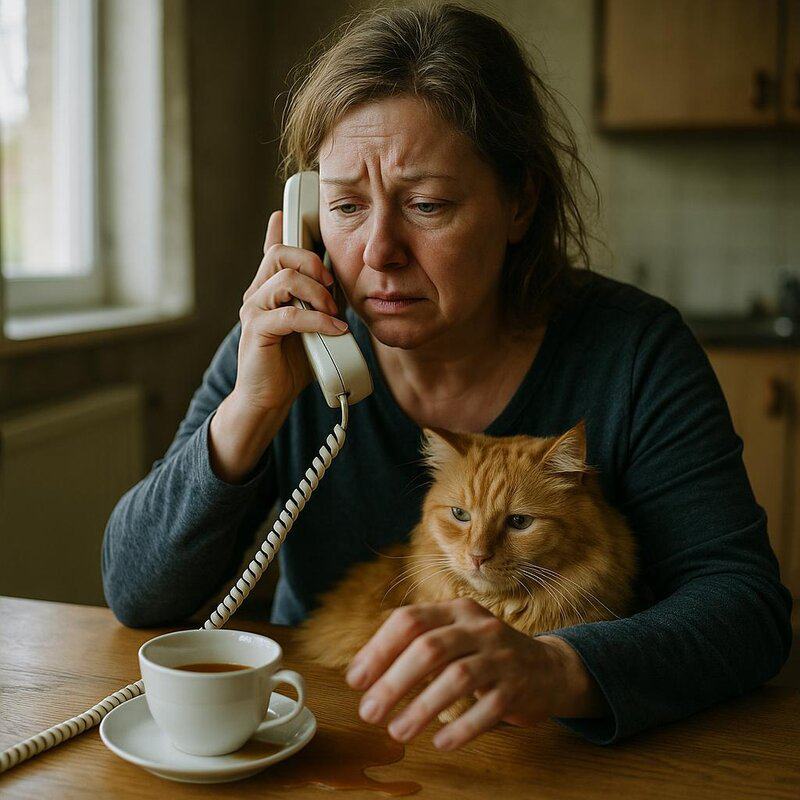
The Bigger Picture
The morning after Detective Suarez’s visit, Molly burst through my front door with her laptop and a stack of printouts, her face flushed with excitement and outrage. ‘Aunt Carol, you need to see this,’ she said, spreading papers across my kitchen table. ‘This isn’t just about your garden.’ As Jasper weaved between the chair legs, Molly revealed what her librarian research skills had uncovered—a pattern so disturbing it made my blood run cold. The Harrells weren’t just greedy neighbors; they were scouts for Harrell Development Group, a company with a history of targeting neighborhoods like ours. ‘Look here,’ Molly pointed to news clippings from two counties over. ‘Same pattern. They buy one property, create boundary disputes with elderly homeowners, and pressure them to sell at reduced prices.’ My hands trembled as I examined photos of a block of luxury condominiums where family homes once stood. ‘They’ve done this twice before,’ Molly explained, showing me before-and-after satellite images. ‘Their modern monstrosity next door isn’t their dream home—it’s just their foot in the door.’ I felt sick realizing their endgame wasn’t just my azaleas but our entire street. ‘That’s why Brandon was so smug,’ I whispered, remembering his confident smirk. ‘They never expected anyone to fight back.’ What Molly showed me next would not only change the course of our case but potentially save dozens of other seniors from becoming victims of the Harrells’ predatory scheme.
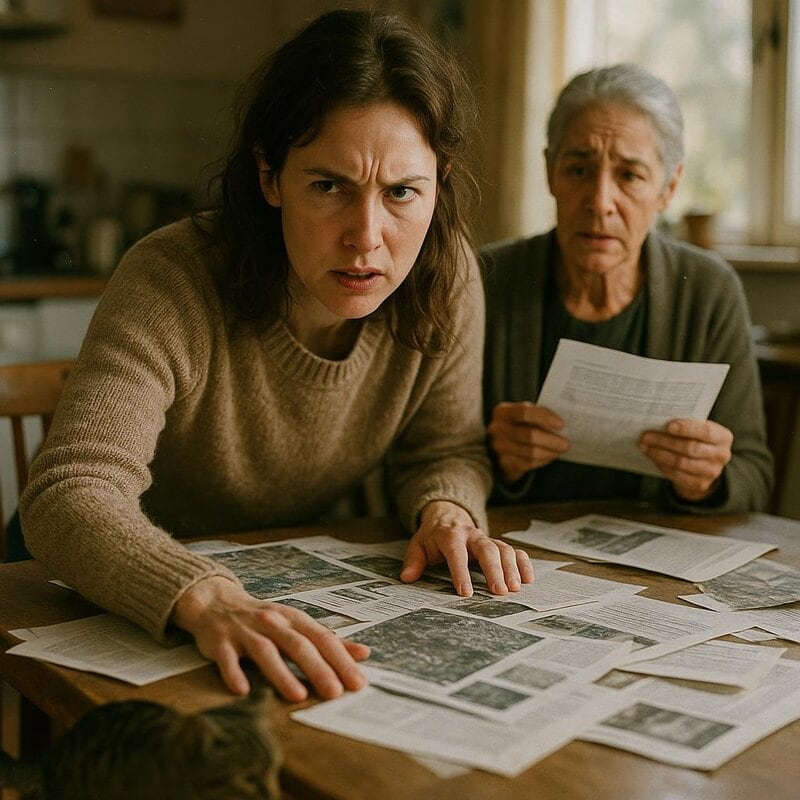
Neighborhood Meeting
I never imagined at 72 that I’d be standing in front of nearly fifty neighbors at the community center, but there I was, watching Molly connect her laptop to the projector. ‘My aunt Carol isn’t the only victim,’ she announced, her voice steady with righteous anger. The room fell silent as she displayed satellite images showing how the Harrells had transformed entire neighborhoods in two counties. ‘They’re not building a home—they’re establishing a beachhead,’ she explained, clicking through slides of luxury condominiums where family homes once stood. One by one, neighbors began raising their hands, sharing stories that made my blood boil. Martha Jenkins, 81, mentioned receiving a letter claiming her driveway encroached on county land. The Wilsons had been approached with a suspiciously low offer just last week. ‘They told us our foundation was cracking and we should sell before it got worse,’ Tom Wilson said, his face flushed with anger. ‘Our house passed inspection just last year!’ By the time we finished, we’d formed the Hillside Neighborhood Association with a legal defense fund and weekly meeting schedule. As everyone signed the membership roster, I felt something I hadn’t experienced since this nightmare began—hope. Standing there surrounded by neighbors who refused to be bullied, I realized the Harrells had made a critical miscalculation. They thought isolated seniors would be easy targets, but they never counted on us banding together. What none of us realized was that someone in that very room was secretly reporting our every move back to Brandon Harrell.
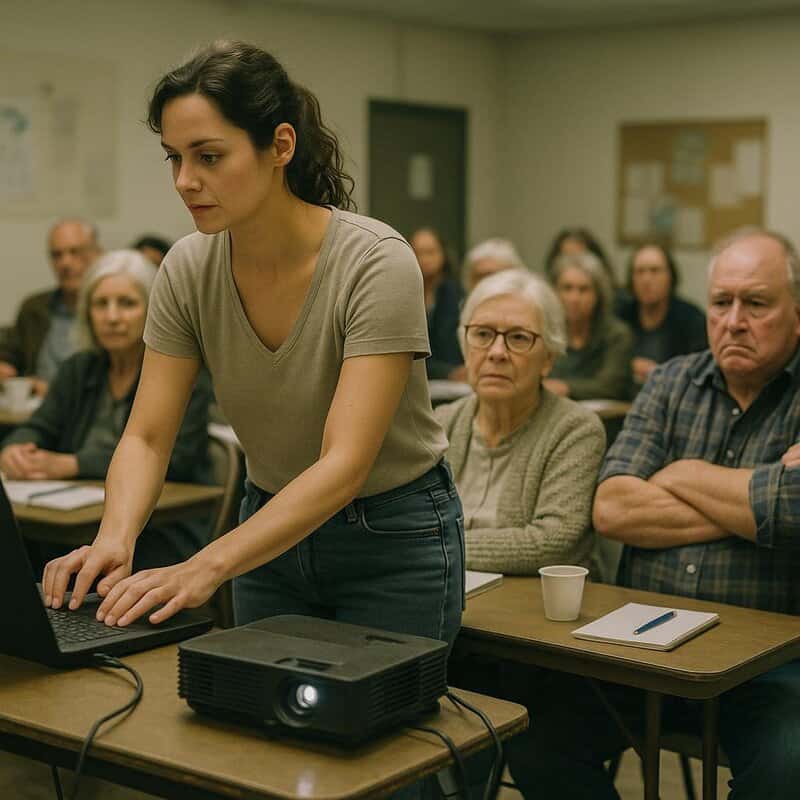
Media Attention
I never expected to become a local celebrity at 72, but that’s exactly what happened when Zoe Chen from the Hillside Herald knocked on my door. She was barely older than my grandniece, with bright eyes and a recorder in hand. ‘Mrs. Fletcher, your story needs to be told,’ she insisted. I hesitated, clutching my cardigan closer. ‘I’m not one for the spotlight, dear.’ But Molly, ever practical, pulled me aside. ‘Aunt Carol, think about all the other seniors they might target next. Your story could protect them.’ That settled it. The next morning’s paper nearly gave me heart palpitations—there I was on the front page, standing defiantly in my divided garden. ‘Grandmother Takes On Developer’s Fraudulent Land Grab’ blazed across the top. By noon, my ancient landline wouldn’t stop ringing. Channel 5 wanted an interview. The Tribune needed a statement. Even that internet radio thing Molly listens to called. Most shocking of all, Molly showed me something called ‘Twitter’ where apparently #DontMessWithCarol was ‘trending’—whatever that means. ‘You’ve gone viral, Aunt Carol!’ she exclaimed, while I wondered if I needed antibiotics for that. What I didn’t realize was how quickly this attention would force the Harrells into a corner—and desperate people do desperate things.
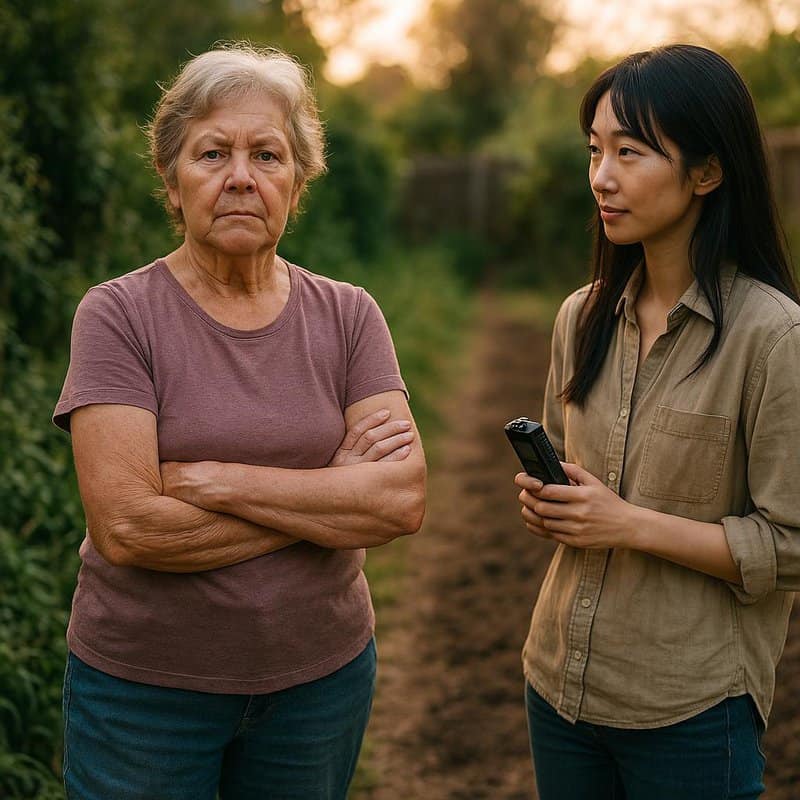
The Harrells’ Countermove
I was washing dishes when I spotted them—glossy flyers stuffed in mailboxes up and down our street. The Harrells were fighting back with a PR campaign that made my blood boil. Their press release claimed they were the victims of ‘ageist assumptions’ and a simple ‘misunderstanding.’ Can you believe the nerve? These people forged documents, tried to steal my garden, and now they were playing the victim card! That evening, as I was watering what remained of my azaleas, a familiar Tesla pulled into my driveway. Brandon Harrell himself, looking less confident than before but still wearing that expensive cologne that smelled like trouble, knocked on my door. ‘Mrs. Fletcher,’ he said with a practiced smile that didn’t reach his eyes, ‘I think we got off on the wrong foot.’ He pulled out an envelope. ‘Inside is a very generous settlement offer—well above market value for your property.’ His eyes darted around nervously. ‘All you need to do is drop the case and sign the papers.’ I looked at this man who’d tried to bully me, who’d cut through the garden Walter and I had tended for decades, who thought I could be bought. ‘Mr. Harrell,’ I said calmly, ‘I’m not interested in your money or your vision for neighborhood improvement.’ Then I did something that would’ve made Walter proud—I closed the door right in his smug face. What I didn’t know then was that Brandon had already convinced three of my neighbors to sell, and his ‘community meeting’ the next evening would reveal plans far more ambitious than any of us had imagined.

The Harrells’ Meeting
I never thought I’d willingly walk into the lion’s den, but there I was at the Hillside Hotel conference room, Molly by my side, watching Brandon and Kenzie set up their slick presentation. The room filled quickly with curious neighbors, some I recognized from our own meeting. The Harrells had gone all out—champagne, fancy appetizers, and glossy brochures showing what they called ‘Hillside Heights.’ Their 3D renderings displayed gleaming glass condominiums where our homes currently stood, complete with rooftop gardens and a community pool. ‘Increased property values of up to 40%,’ Brandon promised, his voice smooth as butter as he clicked through slides. ‘A modern community for the future.’ I watched my neighbors’ faces—some looked impressed, others skeptical. When they finally opened the floor for questions, I felt Molly squeeze my hand encouragingly. I stood up, my knees creaking slightly, but my voice steady and clear. ‘Mr. Harrell,’ I said, loud enough that everyone turned to look, ‘I’m curious how many other neighborhoods you’ve shown these exact same presentations to before altering their property records?’ The room went so quiet you could hear a pin drop. Brandon’s smile froze on his face as he fumbled with his clicker. ‘I—that’s not—’ he stammered, looking desperately at Kenzie. Several people began whispering, and I noticed Mrs. Abernathy, who’d seemed ready to sign something earlier, slowly putting her pen away. What happened next would prove that sometimes, the most powerful weapon against corruption isn’t lawyers or detectives—it’s simply the truth spoken aloud.
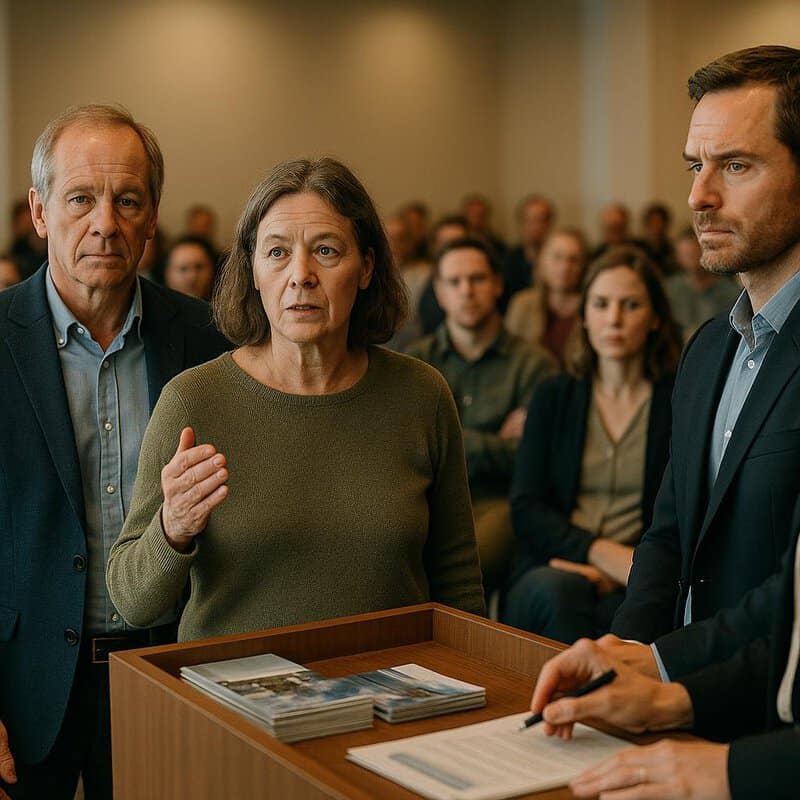
Anonymous Tip
The morning after the Harrells’ meeting, I was sipping my chamomile tea when Detective Suarez called. ‘Mrs. Fletcher, we’ve received something interesting,’ she said, her voice hushed with excitement. ‘An anonymous email with financial records from Harrell Development Group.’ She explained that Brandon and Kenzie weren’t just dishonest—they were desperate. Their company was drowning in debt, with investors threatening to pull funding if they couldn’t secure our entire block. ‘People do crazy things when they’re about to lose everything,’ she warned. That afternoon, Hank and I sat at my kitchen table reviewing the documents Detective Suarez had forwarded. The numbers were staggering—millions in loans, missed payments, and angry investor emails. ‘No wonder they tried to steal your garden,’ Hank muttered, adjusting his bolo tie. ‘They’re not just greedy—they’re cornered.’ I watched Jasper batting at a dust mote in the sunlight, blissfully unaware of human schemes. ‘So what happens now?’ I asked. Detective Suarez had mentioned this evidence strengthened our case, but also made the Harrells more dangerous. ‘Desperate people take desperate measures,’ she’d cautioned. I couldn’t help wondering who had sent those records—someone inside their company? A disgruntled investor? What I didn’t realize was that the anonymous tipster was much closer than any of us imagined, and their next revelation would turn this entire case upside down.

The Whistleblower
I never expected the anonymous tipster to walk right into Hank’s wood-paneled office, but there she was—Jessica Winters, a petite woman with determined eyes and a folder thick with evidence. ‘I worked for the Harrells for three years,’ she explained, settling into the leather chair across from me. ‘I was their office manager until I questioned their tactics.’ Detective Suarez leaned forward as Jessica spread documents across Hank’s desk. ‘They have a system,’ she continued, her voice steady but bitter. ‘They specifically target neighborhoods with high percentages of seniors. They literally have a checklist—residents over 70, long-time homeowners, people living alone.’ My stomach turned as she pointed to a map with our street highlighted in red. ‘Your neighborhood was perfect for them—established residents they assumed wouldn’t have the energy or resources to fight back.’ Jessica had been fired after questioning the ethics of their operation, but not before downloading files that proved everything. ‘They’ve done this in Oakridge and Pinecrest too,’ she said, showing us photos of demolished homes replaced by luxury condos. ‘They forge documents, intimidate residents, and then swoop in with lowball offers when people get scared.’ As Jasper jumped into my lap, seeking comfort from my obvious distress, Jessica looked me straight in the eyes. ‘Mrs. Fletcher, you’re the first person who’s ever stood up to them—and they’re terrified of you.’ What none of us realized was that while Jessica was revealing the Harrells’ secrets, Brandon was making one final, desperate move that would change everything.
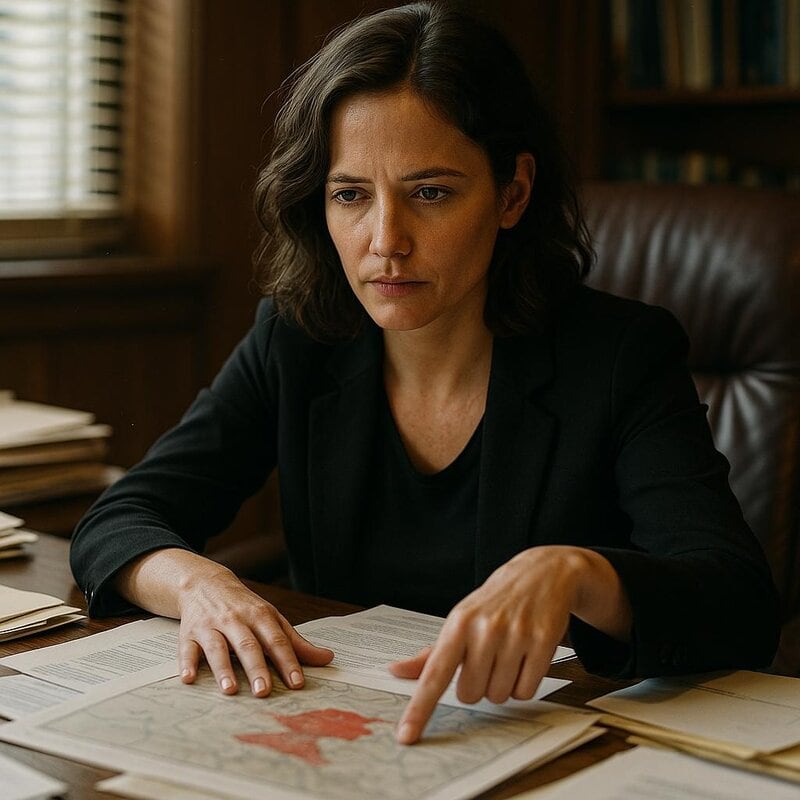
Criminal Charges
I never imagined I’d feel satisfaction watching someone being led away in handcuffs, but there I was at 72, peering through my kitchen curtains as police cars lined our quiet street. The district attorney had finally filed criminal charges against Brandon, Kenzie, and Tyler Harrell—fraud, forgery, and tampering with public records. My heart pounded as officers escorted the Harrells from their glass-and-steel monstrosity, Brandon’s confident smirk replaced by shocked disbelief. Kenzie’s designer heels clicked awkwardly as she shuffled to the patrol car, handcuffed and fighting tears. Neighbors emerged from their homes like cautious woodland creatures after a storm, gathering on sidewalks to witness justice in action. Mrs. Abernathy, who’d nearly signed away her home, actually applauded. Molly squeezed my shoulder as we watched the patrol cars pull away. ‘You did this, Aunt Carol. You stood up when everyone expected you to back down.’ That modern house that had seemed so imposing—that symbol of everything wrong with progress without conscience—now stood empty and silent. Jasper rubbed against my ankles as I made a fresh pot of tea, my hands still trembling slightly. The criminal charges meant this wasn’t over yet—we’d have court dates and testimony ahead—but for the first time in months, I felt like I could breathe again. What I couldn’t possibly know then was that the Harrells’ arrest was about to uncover a network of corruption that stretched far beyond our little Tennessee neighborhood, and my quiet life was about to get a whole lot more complicated.
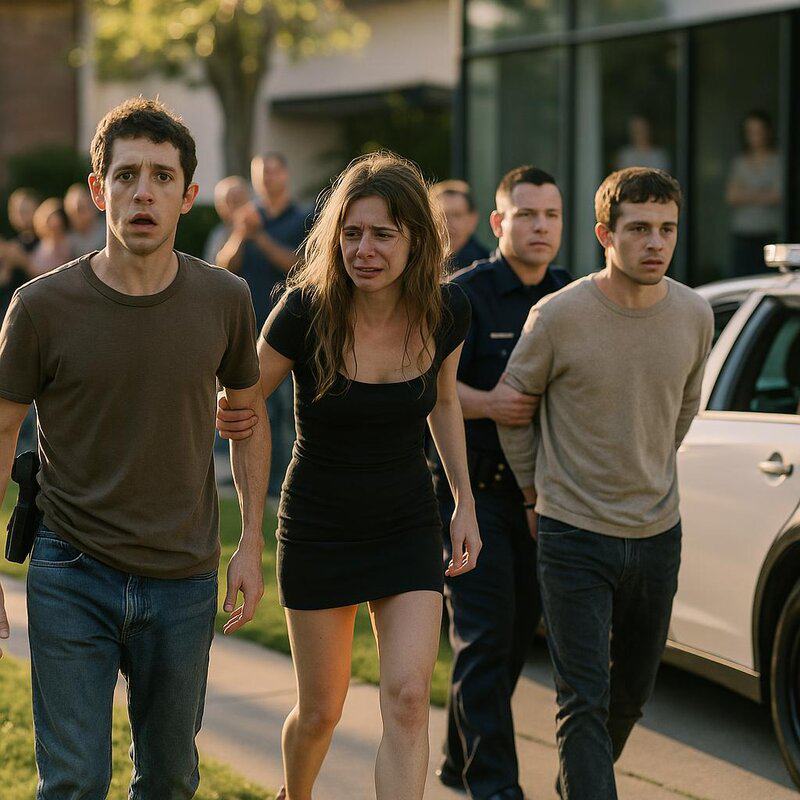
The Civil Ruling
The day of the civil ruling felt like Christmas morning, New Year’s Eve, and my birthday all rolled into one. I arrived at the courthouse clutching my purse so tightly my knuckles turned white, with Molly and Hank flanking me like protective bookends. Judge Simmons—a no-nonsense woman with silver-rimmed glasses and a reputation for fairness—didn’t waste any time. ‘The court finds clear evidence of fraud and malicious intent,’ she declared, her voice ringing through the courtroom. ‘This kind of predatory behavior against homeowners will not be tolerated.’ I nearly collapsed with relief when she ordered the Harrells to remove that awful fence immediately and pay damages for my destroyed garden. The look on Brandon’s face when she mentioned ‘legal fees’ was worth framing—his smug smile finally wiped clean off. As we left the courthouse, reporters swarmed around us like bees to honey. ‘Mrs. Fletcher, how does it feel to win?’ one young man shouted, thrusting a microphone toward me. I surprised myself with my answer: ‘It feels like justice isn’t just for the young and powerful.’ That evening, as I watched contractors dismantling the fence board by board, I sipped my chamomile tea and felt truly victorious for the first time in months. What I didn’t realize was that while this battle was over, the war against predatory developers was just beginning—and somehow, I’d become its unlikely general.

Fence Removal Day
I woke up at dawn on fence removal day, too anxious to sleep. By 7:30 AM, the contractors’ trucks were rumbling down our quiet street. I stood on my back porch in my old gardening sweater, clutching a mug of tea that had long gone cold, as the first worker approached the wooden monstrosity that had divided my garden. ‘We’ll be careful with what’s left of your plants, ma’am,’ he promised, tipping his hard hat. Each plank that fell felt like a weight lifting from my chest. Jasper weaved between my ankles, seemingly aware of the significance. Around noon, Martha from across the street appeared with a basket of sandwiches for the workers and a small azalea bush for me. ‘From my mother’s garden,’ she explained. ‘It’s a fighter, just like you.’ By mid-afternoon, a parade of neighbors had formed—Tom and Louise with rose cuttings, the Hendersons with perennials, even young Mr. Patel with herbs for what he called my ‘victory garden.’ As the last fence post came out, leaving nothing but disturbed earth where that awful barrier had stood, I felt Walter’s presence so strongly I almost turned to look for him. The garden was still wounded, the azaleas trampled, the stone path disrupted—but the property line was mine again. Standing there as the sunset painted everything gold, surrounded by neighbors and their gifts of new beginnings, I realized something profound: the Harrells hadn’t just attacked my property—they’d awakened a community. What none of us could have predicted was how this garden would soon become something much more significant than just my personal victory.
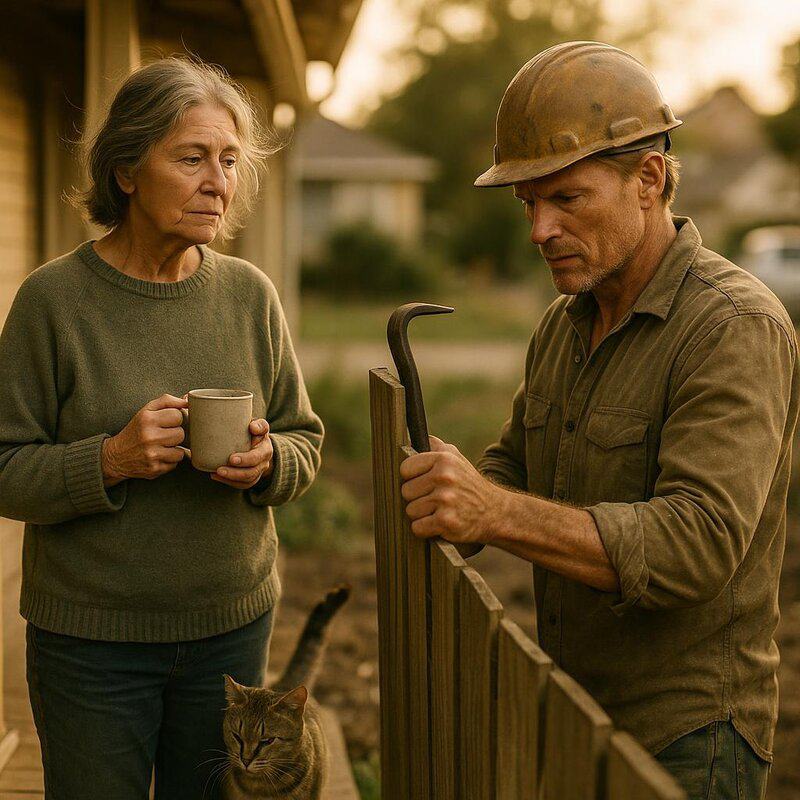
Professional Consequences
I never thought I’d feel such satisfaction watching someone’s professional life crumble, but after what the Harrells put me through, I couldn’t help but smile when Molly showed me the newspaper. ‘Aunt Carol, look!’ she exclaimed over Sunday brunch, sliding the business section across my kitchen table. There it was in black and white: ‘Harrell Development Files Chapter 11 Following Fraud Allegations.’ The article detailed how the state real estate board had conducted an emergency hearing and revoked Kenzie’s license. Brandon’s investors had pulled out faster than cats running from a vacuum cleaner, leaving his company bankrupt. And Tyler—that sneaky cousin from the zoning department—had been fired and now faced additional charges for tampering with other property records beyond mine. ‘Karma doesn’t forget an address,’ Molly said, refilling my coffee cup. Every morning when I look out my kitchen window, I see their modern monstrosity sitting empty across the property line—all steel, glass, and broken dreams. The neighbors have taken to calling it ‘Carol’s Trophy.’ Jasper seems particularly pleased, spending hours sunning himself in my recovering garden, occasionally glancing at the abandoned house as if to say, ‘We showed them, didn’t we?’ What none of us realized was that the Harrells’ downfall was about to attract attention from people far more powerful than any of us had imagined.

Celebration Dinner
I never imagined a victory dinner could feel so sweet at 72. That evening, as the sunset painted my porch in golden hues, I set out my best checkered tablecloth and mama’s old china plates. Molly arrived first with a bucket of fried chicken from Wilson’s—my absolute favorite—followed by Hank still wearing his bolo tie despite the casual occasion. ‘Wouldn’t miss this for the world, Carol,’ he said, setting down a bottle of sparkling cider. Detective Suarez surprised us all by showing up in jeans instead of her usual professional attire, bringing homemade cornbread that smelled like heaven. One by one, neighbors filled my porch—the Wilsons, Martha Jenkins with her famous pecan pie, even shy Mr. Patel from down the street. As fireflies began to dance in my recovering garden, Molly raised her glass of sweet tea high. ‘To justice—and never underestimating Aunt Carol!’ Everyone clinked glasses, and I felt tears threatening to spill. ‘I couldn’t have done this without all of you,’ I managed, my voice catching. ‘You fought for yourself, Carol,’ Detective Suarez corrected gently. ‘We just had the good sense to follow your lead.’ As laughter and conversation flowed around me, I gazed at my garden where Jasper prowled contentedly among the recovering azaleas. What none of us realized as we celebrated that night was that our little victory was about to inspire something much bigger than any of us could have imagined.
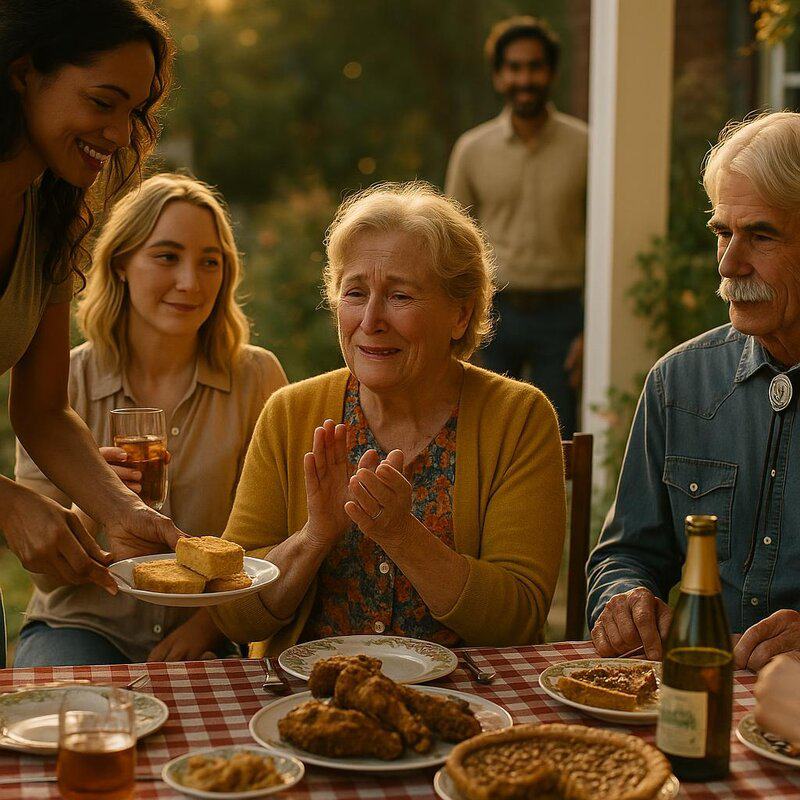
Garden Restoration
I woke up Saturday morning to the sound of laughter in my front yard. Peeking through the curtains, I couldn’t believe my eyes—at least twenty neighbors had gathered with shovels, wheelbarrows, and flats of flowers. ‘Surprise, Aunt Carol!’ Molly called out, waving a garden trowel like a magic wand. ‘We’re here to fix what the Harrells destroyed!’ I hurried outside in my robe and slippers, overwhelmed by the sight. George Peterson, who’d landscaped half the county before his knees gave out, had sketched a beautiful design that preserved Walter’s stone path while adding new elements. ‘We’re keeping the spirit but giving it some fresh life,’ he explained, his weathered hands tracing the paper. The day unfolded like a beautiful community quilt—Mrs. Jenkins and her grandchildren planted azaleas, teenagers I barely knew hauled mulch and compost, and little Emma Peterson solemnly placed painted rocks along the borders. By sunset, we all gathered on my porch, dirty and exhausted but beaming with pride. My bisected garden was whole again—different, but somehow more beautiful than before. ‘It’s like us,’ Molly said softly, her arm around my shoulders as we surveyed our work. ‘Stronger after being broken.’ What none of us realized as we toasted with lemonade was that a reporter from the state newspaper had been quietly taking photos all day, and my little garden was about to become a symbol of something much bigger than any of us had imagined.
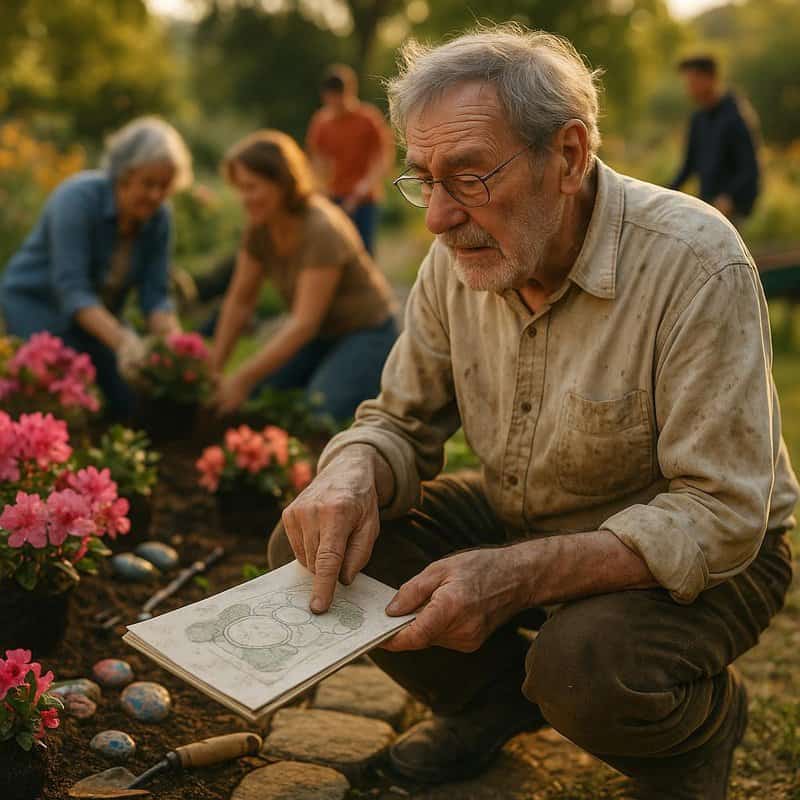
The Empty House
For weeks, that glass-and-steel monstrosity next door stood empty, a hollow monument to the Harrells’ greed and downfall. I’d catch myself staring at it while watering my restored garden, wondering how something built with such arrogance could look so sad. The neighborhood children started whispering that it was haunted, running past it with theatrical screams that made me smile despite myself. ‘Ghost house,’ they called it, though the only spirits there were broken dreams and bad decisions. Then one Tuesday morning, a ‘For Sale by Bank’ sign appeared, stabbed into the perfectly manicured lawn like a final verdict. The asking price nearly made me choke on my morning tea—almost $200,000 less than what Brandon had bragged about investing. ‘Would you look at that,’ Hank whistled when he drove me to my doctor’s appointment. ‘Karma’s got a calculator.’ I nodded, but found myself feeling an unexpected twinge of pity. Not for their scheme collapsing—they’d earned every bit of that—but for how thoroughly greed had consumed them. That evening, as Jasper and I sat on the porch watching the sunset reflect off those enormous windows, I wondered who might eventually move in. Would they be neighbors worth knowing, or just another chapter in our street’s increasingly complicated story? What I couldn’t possibly know then was that the bank’s decision about that property would soon connect me to someone from my past in ways I never could have imagined.

The Trial Begins
I never imagined at 72 that I’d be the star witness in a criminal trial, but there I was, clutching my purse in the witness box while the prosecutor guided me through my testimony. The courtroom felt impossibly large that day, with its polished wood and stern-faced judge. My voice shook at first as I recounted how the Harrells had stolen my garden, altered my property records, and tried to bully me into submission. But with each question, I grew steadier, stronger. The jury—a mix of young professionals and folks my age—leaned forward when I described finding that fence cutting through Walter’s stone path. ‘It wasn’t just dirt and plants they took,’ I told them, my voice finally firm. ‘It was fifty years of memories.’ The prosecution’s evidence was damning—maps, forged documents, and testimonies from other neighborhoods where the Harrells had pulled similar stunts. During a recess, I nearly collided with Kenzie in the hallway. Gone were the designer clothes and impossible heels, replaced by a simple blouse and flat shoes. Our eyes met briefly, and I saw something I never expected—shame. She looked away quickly, her shoulders hunched forward like she was carrying something heavy. I almost felt sorry for her. Almost. What I didn’t realize then was that someone else was watching our exchange from the shadows, someone whose testimony would turn this entire case upside down.
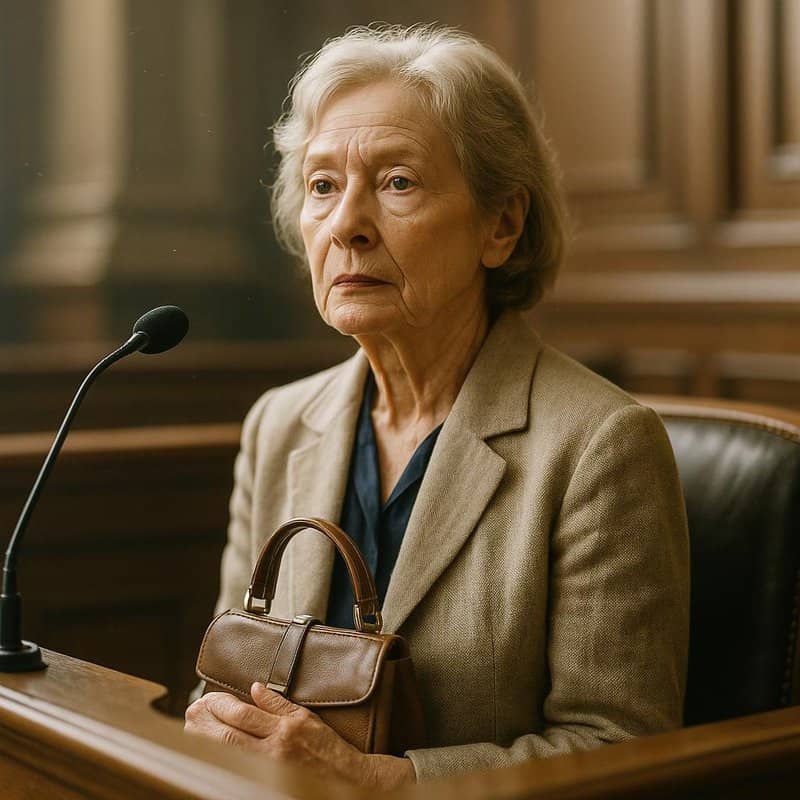
Media Circus
I never imagined my little garden dispute would turn me into a national sensation at 72. The morning after my testimony, I opened my curtains to find three news vans parked along our quiet street. ‘Mrs. Fletcher! Can we get a statement?’ they called as I collected my newspaper. Reporters thrust microphones at me whenever I stepped outside, asking how it felt to ‘take down corporate predators.’ My phone rang constantly with calls from numbers I didn’t recognize. The most surprising was from Diane Winters at True American Stories, who wanted to feature me in their documentary series ‘Golden Years, Iron Will.’ ‘You’re the perfect example of seniors fighting back,’ she explained enthusiastically. ‘People are calling you the Garden Gladiator!’ I nearly choked on my tea hearing that. Molly became my unofficial press secretary, screening calls and escorting me through the courthouse gauntlet. ‘Don’t make eye contact unless you want to talk,’ she’d whisper, gripping my elbow protectively. ‘And remember, you don’t owe them anything.’ One evening, as we dodged cameras on our way to the car, she squeezed my hand. ‘You’ve become a symbol, Aunt Carol,’ she said proudly. ‘People are inspired by how you stood up to them.’ I wasn’t sure how I felt about being a symbol—I’d only wanted my garden back. But as letters started arriving from seniors across the country sharing similar stories, I realized this wasn’t just about my azaleas anymore. What I couldn’t possibly know then was that someone very powerful was watching my story unfold, someone who would soon offer me a platform I never dreamed of having.
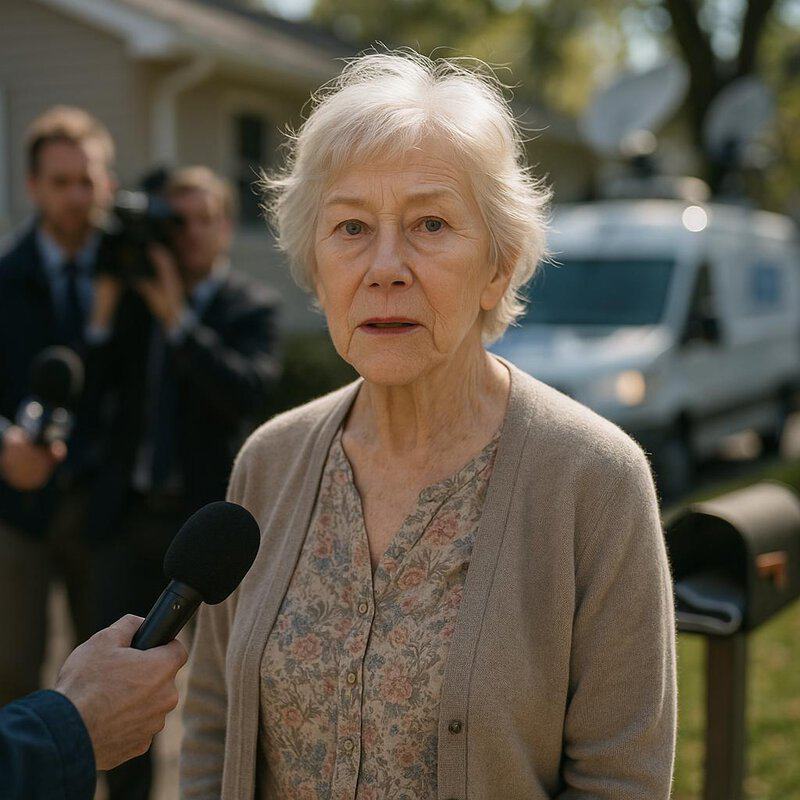
The Verdict
I never imagined I’d feel such profound relief in a courtroom at 72 years old. After two grueling weeks of testimony, the jury filed back in, their faces unreadable. My heart hammered against my ribs as the foreman stood. ‘On all counts, we find the defendants guilty.’ The courtroom erupted in murmurs while I sat perfectly still, tears welling in my eyes. Judge Simmons didn’t waste time with sentencing – three years for Brandon and Kenzie, eighteen months for cousin Tyler, plus restitution for all the damage they’d caused. As the bailiff led them away, Brandon turned back toward me. His expression wasn’t what I expected – not pure hatred, but something more complex, like he finally recognized he’d underestimated the wrong little old lady. Outside on the courthouse steps, reporters swarmed around me like bees to honey. ‘Mrs. Fletcher! How does it feel to win?’ a young woman shouted, thrusting a microphone in my face. I straightened my shoulders and looked directly into the camera. ‘This wasn’t about winning,’ I told her, my voice steadier than I felt. ‘It was about standing up for what’s right. About showing that age doesn’t make you powerless.’ Molly squeezed my hand as cameras flashed around us. What none of us realized then was that my little stand against neighborhood bullies was about to inspire a movement that would reach far beyond our Tennessee hills.
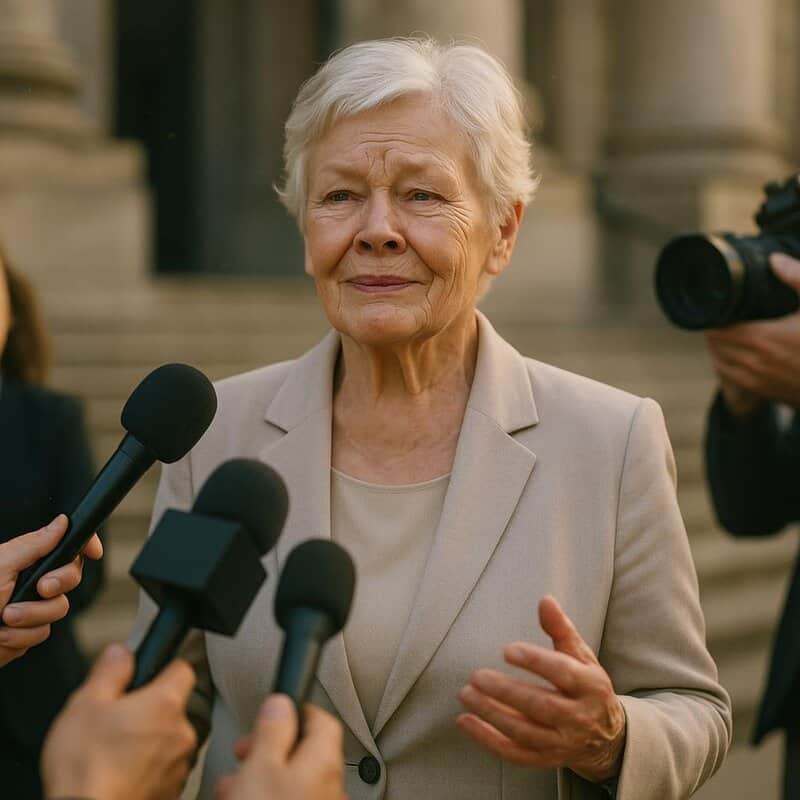
New Neighbors
Six months after the verdict, I noticed a moving truck pulling up to the Harrells’ empty glass monstrosity. I’ll admit, I watched from behind my curtains like the nosy old woman I’ve become. The ‘For Sale by Bank’ sign had finally disappeared last week, but I hadn’t expected new neighbors so quickly. The house had stood empty for so long that Jasper had claimed the front yard as his personal hunting ground. By afternoon, I’d worked up the courage to peek over my garden fence, curious about who’d buy such an eyesore. Instead of more young professionals with Tesla cars and designer clothes, I spotted a middle-aged couple directing movers with gentle efficiency. The woman was placing colorful potted plants along the harsh steel edges of the porch—softening those severe lines that had always looked so out of place in our neighborhood. The next morning, my doorbell rang. There stood a woman with warm brown eyes and silver-streaked hair, holding a homemade pie that smelled like heaven. ‘Mrs. Fletcher? I’m Elena Mendoza. My husband Miguel and I just moved in next door.’ She smiled genuinely. ‘We’ve heard all about you from the neighbors. You’re something of a local legend.’ I blushed as she continued, ‘We’re honored to be your neighbors.’ I invited them for Sunday dinner the following weekend, feeling something I hadn’t expected—hope. As I watched them transform that cold house with warm exterior lights and flowering shrubs, I realized the Harrells’ legacy was finally being erased. What I couldn’t possibly know then was that Elena Mendoza had her own fascinating history with property disputes—and a surprising connection to someone from my past.

The Documentary
I never imagined I’d see my face on television at 72, much less in a documentary called ‘Don’t Fence Me In: How Carol Fletcher Fought Back.’ Sitting between Molly and Hank on my floral sofa, remote clutched in my trembling hand, I barely recognized the determined woman on screen. ‘That’s not me,’ I whispered as the camera zoomed in on my face during court testimony. ‘That’s absolutely you,’ Molly insisted, squeezing my hand. ‘The real you.’ The producers had done a remarkable job weaving together interviews with me, Molly, Hank, and Detective Suarez, creating a narrative that felt both personal and universal. They ended with footage of our garden restoration party—neighbors planting azaleas, teenagers hauling mulch, and little Emma placing her painted rocks. The message was clear: this wasn’t just my victory; it belonged to our entire community. The morning after it aired, my ancient computer dinged continuously with email notifications. ‘Aunt Carol, you’ve gone viral!’ Molly exclaimed, scrolling through my inbox. Dozens of seniors from across the country had written, sharing similar stories of being bullied by developers and asking for advice. ‘Dear Mrs. Fletcher,’ one message began, ‘You’ve given me courage to fight my own battle…’ I sat there in my bathrobe, coffee growing cold, overwhelmed by the responsibility suddenly thrust upon me. What could I possibly tell these people? I was just a widow who wanted to save her garden. But as I read message after message, I realized something important was happening—something that went far beyond my pink azaleas and Walter’s stone path. What I couldn’t possibly know then was that one of those emails would lead me to discover the Harrells weren’t just isolated predators, but part of a much larger scheme targeting seniors across multiple states.

The Support Group
I never imagined my garden dispute would spark a movement at 72. After the documentary aired, my inbox flooded with messages from seniors facing similar battles. ‘We need to do something,’ I told Molly one morning over coffee. ‘These people need help.’ Two weeks later, we held our first meeting at the Riverside Community Center. We expected maybe a dozen folks—instead, nearly fifty showed up! Some had driven three hours from neighboring counties. As each person shared their story, my heart broke a little more. Martha from Knoxville had her property line ‘redrawn’ after 40 years. Jim and Louise found their retirement cottage suddenly violating ‘new zoning laws’ after refusing to sell to developers. ‘I thought I was alone,’ whispered Eleanor, an 80-year-old widow clutching paperwork showing how her driveway easement had mysteriously disappeared. ‘They count on our isolation,’ Hank explained, standing at the whiteboard where we’d started mapping patterns. ‘They think seniors won’t fight back or know how to navigate the system.’ By meeting’s end, we had contact information exchanged, a weekly meeting schedule, and Hank offering pro bono legal consultations. We called ourselves ‘The Property Protectors’—Molly’s idea, of course. As I looked around at all those determined faces, I realized the Harrells hadn’t just stolen part of my garden—they’d accidentally given me a purpose bigger than my azaleas. What none of us could have predicted was how quickly our little support group would attract attention from people who definitely didn’t want us comparing notes.
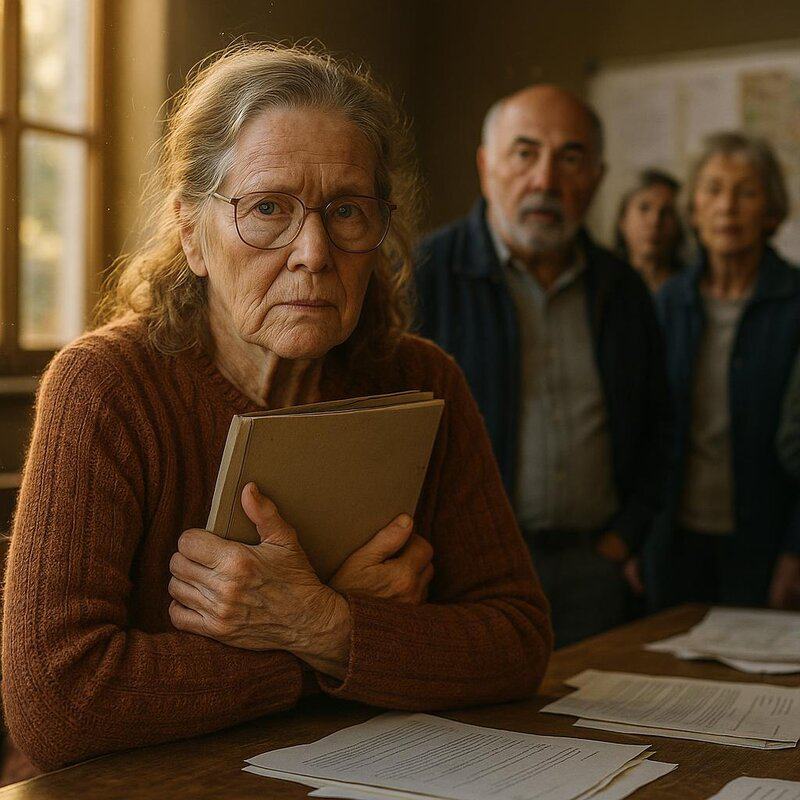
Legislative Interest
I never imagined at 72 that I’d be sitting before a state legislative committee, my hands trembling slightly as I adjusted the microphone. The marble walls of the capitol building felt imposing, but the fire in my belly burned brighter than my nerves. ‘My name is Carol Fletcher,’ I began, my voice steadier than I expected. ‘Three months ago, I was just a widow trying to protect my garden. Today, I represent hundreds of seniors across our state facing similar battles.’ Senator Diane Williams, a no-nonsense woman with silver-streaked hair, nodded encouragingly as I detailed the Harrells’ scheme and the patterns we’d uncovered through our support group. ‘These aren’t isolated incidents,’ I explained, holding up a folder of testimonials. ‘They’re calculated strategies targeting vulnerable homeowners who they assume won’t fight back.’ The committee members leaned forward, some taking notes, others frowning deeply. When I finished, Senator Williams thanked me with unexpected emotion in her voice. ‘Mrs. Fletcher, your courage has illuminated a serious problem.’ Two weeks later, Molly burst through my front door waving her tablet. ‘Aunt Carol! They’re introducing legislation!’ There on the screen was Senator Williams announcing a new bill strengthening protections against property record tampering. ‘We’re informally calling it Carol’s Law,’ she told reporters with a smile. That evening, as Jasper purred in my lap, I stared at my garden through the window, marveling at how my little fence dispute had somehow led to changing state law. What I couldn’t possibly know then was that not everyone in the capitol was pleased with my testimony—and that one powerful developer was already working to make sure ‘Carol’s Law’ never saw the light of day.

One Year Later
I never imagined that a year after my garden battle, I’d be sitting on my porch feeling so… peaceful. The azaleas that were once bisected by that awful fence have flourished again, their pink blooms more vibrant than ever. Walter’s stone path looks better than new, winding through beds of flowers contributed by neighbors during our restoration day. ‘Your garden has more stories than most people,’ Elena Mendoza told me yesterday as we shared iced tea on the porch. She and Miguel have transformed that glass monstrosity next door into something almost charming, with window boxes and warm exterior lights that don’t glare into my bedroom at night. Our Property Protectors group meets twice monthly now at the community center. We’ve helped three seniors successfully challenge fraudulent property claims, including sweet Mrs. Abernathy who nearly lost her driveway to a developer using the same tactics as the Harrells. ‘You’ve started something important, Carol,’ Hank told me last Sunday dinner, his bolo tie slightly askew as always. ‘People aren’t such easy targets anymore.’ Even Jasper seems more content these days, sunning himself among the new roses while butterflies dance above the garden beds. Sometimes I catch myself wondering what Walter would think of all this—his quiet wife becoming some kind of senior citizen crusader at 72. I like to think he’d be proud. What I couldn’t possibly know as I sat there watching the sunset with my stubborn old cat was that tomorrow’s mail would bring a letter that would connect the Harrells to something much bigger than our neighborhood dispute.

A Letter from Prison
I never expected to hear from Kenzie Harrell again, let alone receive a letter from her in prison. The envelope sat on my kitchen table for three days before I worked up the courage to open it. When I finally did, her neat, precise handwriting caught me off guard – somehow I’d expected angry scrawls, not this careful penmanship. ‘Dear Mrs. Fletcher,’ she began, ‘I’ve had a lot of time to think about the person I became. I’m sorry for the garden, for the fence, for all of it.’ I read it five times, searching for manipulation between the lines. She wrote about prison counseling, about realizing how Brandon’s ambition had consumed them both, about lying awake at night thinking of my azaleas. ‘What we did to you wasn’t just illegal,’ she wrote, ‘it was cruel.’ I showed the letter to Molly during Sunday dinner. ‘Do you believe her?’ she asked, studying my face. I stirred my tea slowly. ‘I don’t know,’ I admitted. ‘Part of me wants to. Another part remembers her standing in court, swearing on the Bible that my garden had always been on their property.’ That night, I sat on my porch watching fireflies dance above my restored garden. Forgiveness wasn’t something I’d considered – I’d been too busy fighting, then healing. But now the question hung in the air like summer humidity: Was Kenzie’s remorse genuine, or was this another manipulation from someone who’d already proven they would lie to get what they wanted? What I couldn’t possibly know then was that her letter contained a detail so small I’d missed it entirely – a detail that would connect the Harrells to something much bigger than our neighborhood dispute.

Carol’s Law Passes
I never imagined at 72 that I’d have a law named after me. The call came on a Tuesday morning while I was deadheading my roses. ‘Carol?’ Senator Williams’s voice crackled through my old flip phone. ‘It passed. Unanimous in the Senate, overwhelming majority in the House.’ My knees went weak, and I sank right onto the garden bench Walter had built decades ago. ‘Carol’s Law’ wasn’t just an idea anymore—it was real. The legislation created strict penalties for property record tampering and established a verification system specifically protecting seniors like me. Two weeks later, I found myself standing behind Governor Harmon at the state capitol, watching her sign the bill with a row of ceremonial pens. The marble halls felt impossibly grand, but Molly squeezed my hand and whispered, ‘You belong here, Aunt Carol.’ Reporters clustered around afterward, thrusting microphones at me. ‘How does it feel to have inspired legislation at your age?’ one young man asked. I straightened my shoulders and looked directly into the camera. ‘It feels like proof that one person can make a difference,’ I answered, my voice steadier than my hands. ‘Age isn’t a limitation—it’s experience.’ That evening, as Jasper curled in my lap and Elena brought over celebratory pie, I gazed at Walter’s photo on the mantel. ‘We did it,’ I whispered to him. What I couldn’t possibly know then was that across the state, someone was already looking for loopholes in Carol’s Law—someone with powerful connections and a personal vendetta against me.

Responding to Kenzie
I never imagined at 72 that I’d be writing to someone who tried to steal my garden. After a week of soul-searching, I sat at my kitchen table with Jasper purring at my feet and penned my response to Kenzie. My hands trembled slightly as I wrote, not from anger but from the weight of choosing compassion over bitterness. ‘Dear Kenzie,’ I began, keeping my tone measured and honest. I told her how the fence had cut through not just azaleas but memories—how Walter and I had planted those bushes the spring after we moved in. I described the community that rallied around me, the legislation her actions had inadvertently inspired, and included a photo of my garden, now flourishing again with pink blooms and Walter’s restored stone path. ‘Sometimes wrong turns lead to unexpected good,’ I concluded after four pages of careful writing. ‘I hope you find your way to a better path.’ As I sealed the envelope, I felt a knot loosen in my chest—something I hadn’t even realized was there. I didn’t expect a response, but sending that letter wasn’t really about Kenzie anymore. It was about me refusing to let resentment take root where my azaleas now bloomed. What I couldn’t possibly know as I dropped that letter in the mailbox was that Kenzie’s response would arrive much sooner than expected—and contain information that would shake our entire community to its core.

The Book Offer
I never imagined at 72 that I’d become an author. The call came through Molly one Tuesday afternoon. ‘Aunt Carol, there’s a publisher on the line who wants to talk to you about your story.’ At first, I laughed it off—who’d want to read about an old woman’s garden dispute? But the publisher was persistent, explaining how my stand against the Harrells could inspire others facing similar battles with corporate bullies and ageism. ‘Your story has resonance,’ she said. ‘It shows that age doesn’t equal powerlessness.’ I hesitated until Molly pointed out something I hadn’t considered: ‘Think of all the seniors who might benefit from hearing how you fought back.’ That’s what finally convinced me. The ghostwriter they assigned, Leanne, was a patient woman with kind eyes who recorded our conversations over tea in my living room. Jasper took to her immediately, which I considered a good sign. Some days were harder than others—revisiting Brandon’s smirk or Kenzie’s cold eyes made my blood pressure rise all over again. But there was something healing about putting it all down on paper, like finally pulling a stubborn weed that had been bothering me for too long. ‘You’re giving voice to something important,’ Leanne told me one afternoon as we reviewed chapters. ‘People need to hear this.’ What I couldn’t possibly know then was that someone very powerful was already trying to stop our book from ever reaching shelves—and they were willing to go to extraordinary lengths to silence me.

Hank’s Health Scare
I never imagined at 72 that I’d be spending my afternoons in a hospital room instead of my garden. The call came on a Tuesday morning—Hank had collapsed while getting his mail. ‘Mild stroke,’ the doctor told us, his face serious but not grim. For two weeks straight, I showed up every day with homemade chicken soup and Walter’s old mystery novels tucked under my arm. The hospital smelled like disinfectant and fear, but Hank’s room became our little sanctuary. ‘Read me the part where the detective figures it out,’ he’d say, his speech slightly slurred but improving daily. One afternoon, as sunlight streamed through the blinds making patterns on his blanket, Hank reached for my hand. ‘You know, Carol,’ he said, his voice raspier than before, ‘helping with your case gave me something I’d lost after retirement.’ His eyes, still sharp despite everything, locked with mine. ‘You didn’t just save your garden. You reminded me why I became a lawyer in the first place.’ I had to look away to hide my tears. The doctors were optimistic about his recovery, but it would be slow—physical therapy, speech exercises, the works. As I arranged fresh flowers by his bedside, I couldn’t help wondering if the stress of my case had contributed to his condition. What I couldn’t possibly know then was that Hank’s hospital room would soon become the unexpected headquarters for the biggest battle we’d faced yet.

The Book Launch
I never imagined at 72 that I’d be signing books with my name on the cover. Our book, ‘The Garden Fence: How I Fought Back Against Corporate Greed,’ finally hit shelves eighteen months after that awful fence came down. The launch event at Riverside Books was supposed to be a small affair, but when I arrived, people were spilling out the door! There stood Molly, beaming with pride, alongside Elena and Miguel, Hank (looking much better now), and even Senator Williams herself. My hands trembled as I read the passage about our community garden restoration party. ‘And then little Emma placed her painted rocks along Walter’s path…’ My voice caught as I looked up at all those faces—neighbors who’d brought casseroles, seniors from our support group, young couples who’d helped replant my azaleas. After the reading, a young woman with bright blue hair raised her hand. ‘What advice would you give someone facing a similar situation?’ she asked. I thought of all we’d been through—the court battles, the legislation, Kenzie’s letter, Hank’s health scare. ‘Trust yourself,’ I answered finally. ‘Age doesn’t diminish your right to justice. And remember, you’re never as alone as they want you to believe.’ The applause warmed me like sunshine. As I signed books afterward, a tall man in an expensive suit lingered at the back of the line, watching me with an intensity that made the hairs on my neck stand up. What I couldn’t possibly know then was that he wasn’t there for an autograph—he was there to deliver a message.
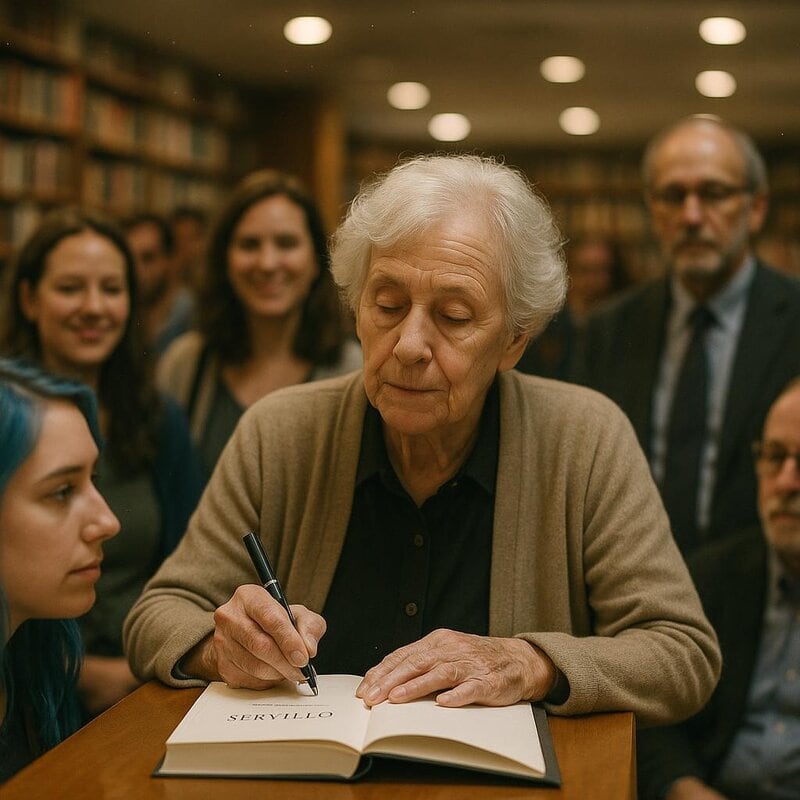
Full Circle
I never imagined at 72 that my little garden dispute would transform not just my life, but an entire community. Two years after that awful fence came down, my azaleas have never looked more vibrant, stretching their pink blooms toward the Tennessee sun like they’re showing off. The Mendozas—who bought the Harrells’ modern monstrosity after the scandal—have become dear friends. Elena brings over her homemade empanadas on Sundays, and Miguel helped me install a small fountain where the fence once stood. ‘It’s like healing water,’ he said, his hands still dirty from digging. Last evening, as Molly and I sat on the porch watching fireflies dance above the garden, she asked if I had any regrets about how everything unfolded. I thought about it all—the stress of court battles, the nerve-wracking television interviews, Hank’s health scare, and those nights I’d lain awake wondering if I was too old to fight. But then I remembered Senator Williams calling about ‘Carol’s Law,’ the letters from seniors who found courage in my story, and the community that rallied around not just me, but each other. ‘Not a single one,’ I told her truthfully, sipping my sweet tea. ‘Being older doesn’t mean being easy to push around. I’ve still got fight in me—and my roses are blooming better than ever.’ What I couldn’t possibly know as we sat there in comfortable silence was that tomorrow’s mail would bring an unexpected invitation that would connect the final dots in the Harrell mystery.






